
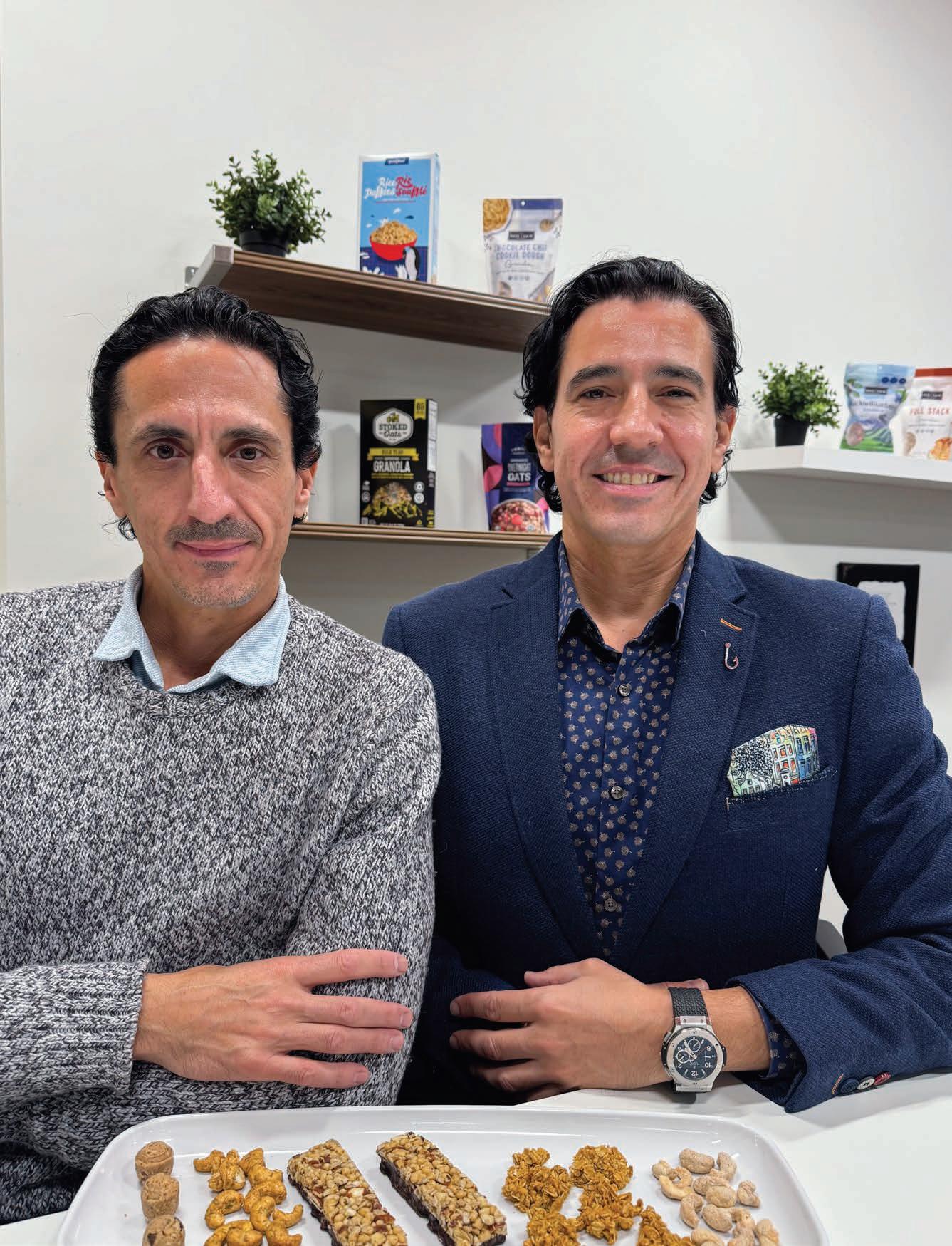
CANADIANPACKAGING.COM MARCH 2024 / $10.00 SERVING CANADA’S PACKAGING COMMUNITY SINCE 1947 CPMA Produce Packaging Outlook 2024 Page 26 Packaging for Freshness Page 37 New X-Ray detection system raises the bar for product safety and quality at hardworking cereal co-packer Story on Page 17 NOAH FRANK, PRESIDENT, STEPHANO GROUP LTD. SEAN FRANK, CEO, STEPHANO GROUP LTD. GRANOLA GOODNESS SHOW PREVIEW April 23-25, 2024 Page 25






COMPLETE SNACK PACKAGING SOLUTIONS
• Accumulation
• Horizontal motion conveying
• Incline, belt and bucket conveyors
• Filling and multihead weighing
• Bagmaking and casepacking
• Checkweighing and seal checking
• Foreign object and defect inspection
98
17
We are successful when you are successful. That’s why we apply creativity, engineering excellence, and determined perseverance to every project to help our customers get the performance their business demands—whether measured by flavor, efficiencies, sustainability, improvement, or innovation.
34



• Controls and information systems info@heatandcontrol.com
116


91 97
102
20
41 26 LOOKING BACK. PRESSING FORWARD. ALWAYS INNOVATING. Apr. 10-11, 2024 Booth 814 Portland, Oregon USA
107 36
Helping you bring your best products to market.
with the
to support
to
and a commitment to
that will help you offer better products for consumers.
Delivering Results. With Heat and Control, you have a partner
scale
your success, the innovation
advance your operations,
quality
| heatandcontrol.com



Videojet 1880 + continuous inkjet printer Unlock high-speed performance and precision Discover more at videojet.com/1880+ Featuring an enhanced design and comprehensive connectivity options ©2024 Videojet Technologies Inc. All rights reserved. Videojet Technologies Inc.’s policy is one of continued product improvement. We reserve the right to alter design and/or specifications without notice.


PACKAGING | INSPECTION | PROCESSING SALES | SERVICE | INTEGRATION E STABLISHED 1990 • QUALITY MACHINES & S E ECIVR • TOLL FREE: (800) 361-5919 ABBEYEQUIPMENT.COM With MULTIPOND’s specialized approach our customer always gets the right MULTIHEAD WEIGHER customized for their specific product requirements. Whether your weighing confectionery, vegetables, frozen foods, fresh products such as cheese or meat, mixtures or non-food products, the Abbey Equipment team will make every effort to work with you to find tailored and optimized solutions. WEIGHING TECHNOLOGY Innovative turnkey solutions for the produce industry. See you at the show - booth #1158



COLUMNS
NEWSPACK 6
FROM THE EDITOR
4 George Guidoni
Ottawa’s ban on single-use plastic packaging threatens to derail the fresh produce industry.
CHECKOUT
40 Shannon Kaupp
Joe Public speaks out on packaging hits and misses.
17 THE GRANOLA GANG
Fast-growing Ontario co-packer of organic granola and cereal blends raises its food safety credentials to the next level following recent installation of a leading-edge, high-speed X-Ray product inspection system.
FEATURES
25 Grow with Us!
A brief preview of next month’s annual CPMA Convention and Trade Show in Vancouver.
26 Ready to Resist
The Canadian Produce Marketing Association (CPMA) says it’s ready to resist Ottawa’s pening ban on single-use plastics for the greater industry good.
32 Top of Mind
One of Ontario’s leading greenhouse operators is taking massive steps to improve its environmental footprint with a switch to innovative recyclable stretch film for wrapping and topsealing its high-quality signature products.
37 Paths to Growth
Leading Ontario packaging distributor quickly establishing a strong presence and foundation for rapid growth in the Canadian fresh produce sector.
March 2024 · CANADIANPACKAGING 3 CANADIANPACKAGING.COM March 2024 Vol. 77, No. 2
DEPARTMENTS
canadianpackaging.com
Packaging news round-up. NOTES & QUOTES 10 Noteworthy industry briefs.
GLANCE 13 New packaging solutions and technologies. ECO-PACK NOW 14 Sustainable packaging innovations.
15 A monthly insight from PAC Global. COVER STORY
FIRST
imPACT
17
ISSN 0008-4654. Canadian Packaging is published 10 times per year by Annex Business Media. Canada Post Publications Mail Agreement No. 40065710. Return undeliverable Canadian addresses to: Circulation Department, 111 Gordon Baker Rd., Suite 400, Toronto, ON M2H 3R1. No part of the editorial content in this publication may be reprinted without the publisher’s written permission. © 2024 Annex Publishing & Printing Inc. All rights reserved. Opinions expressed in this magazine are not necessarily those of the editor or publisher. No liability is assumed for errors or omissions. All advertising is subject to the publisher’s approval. Such approval does not imply any endorsement of the products or services advertised. Publisher reserves the right to refuse advertising that does not meet the standards of this publication. Printed in Canada. ON THE COVER Stephano Group president Noah Frank (left) and chief executive officer Sean Frank strike a cheerful brotherly pose in the reception area of the company’ Etobicoke plant.
25 32
Single-use plastics ban a real political hot potato
P95%
Canada to be sold in bulk or plastic-free packaging by 2028
olitics and packaging are generally not a good mix. And with the federal ban on single-use plastics like clamshell containers, lidded containers, cartons, cups, plates and bowls made from extruded or expanded polystyrene foam, polyvinyl chloride and oxo-degradable plastics, scheduled to come into force on Dec. 20, 2025, many companies in the Canadian fresh produce industry are quickly coming to grips with the realization that time is not on their side.
When Ottawa’s Single-use Plastics Prohibition Regulations went into effect in late 2022, the initial reaction to it by Canadian industry and consumers was fairly muted, as anxiety over the global COVID-19 pandemic dominated the news cycle to the extent of relegating all other public policy developments to the back burner. But with the pandemic now just a passing bad memory, many of the festering issues that were overlooked at the height of the health crisis are now coming to a full boil.
While one would think that given the exceptional role that single-use plastic played in containing and moderating the spread of coronavirus in Canada and abroad would provide an opportunity to reassess the growing anti-plastic backlash and hostility, the Liberal government has shown absolutely no willingness to compromise on the issue in fear of the potential electoral backlash such backtracking would invite in the next federal election.
This reluctance to engage in more constructive engagement with the industry to work out a more feasible implementation date, or to allow for certain exemptions where outright plastics substitution is impossible or even harmful, is sending panic waves throughout the fresh produce supply chain, according to the Canadian Fresh Produce Marketing Association (CPMA)
For CPMA’s packaging specialist Daniel Duguay, the government legislative push to make 95-per cent of fresh produced sold in Canada to be sold in bulk or plastic-fee packaging by 2028 is a “wrong-headed” approach that will do far more harm than good for the industry, consumers and, in a bigger picture, the very cause of sustainability and circularity that the government claims to champion and safeguard.
“That, for all intents and purposes, is not possible without there being some
very dramatic impacts of in terms of food safety, affordability and availability,” Duguay told Canadian Packaging in a recent exclusive interview. (Please see more on pages 26-31)
Not only would such a ban have an immediate negative affect on the already-high inflationary pricing, according to Duguay, but it will also create an unnecessary new obstacle to global trade in fresh fruits and vegetables by curtailing Canada’s imports of such products.
“For every five dollars spent on produce by Canadians, about four dollars go to the purchase of imported products,” Duguay points out. “So if we have a packaging requirement in Canada that is unique to Canada alone, it will really isolate Canada in terms of accessing a lot of the produce grown worldwide.
“This is clearly something that needs to be corrected,” says Duguay, urging the government to put the ban implementation on hold until reaching a greater level of accommodation with the industry and its stake-holders.
“Such a pause would give Ottawa an opportunity to understand the issue better and to make the required corrections,” Duguay states.
According to CPMA president Ron Lemaire, Ottawa’s single-minded obsession with making Canada a world leader in environmental sustainability wilfully ignores the economic reality faced by produce companies in the current high-inflation environment, while drawing wrong conclusions by trying to replicate similar measurse passed in some European countries.
Since the French government first introduced its own ban on plastic packaging for fresh produce over a year ago, for example, it has introduced some 29 exemptions for various types of produce that depend on plastic packaging for extended shelf-life and product freshness.
So while admitting past mistakes may not be a comfortable thought for a government fashioning itself as environmental trail-blazer, getting things right from the outset is a much preferable to trying to rectify past mistakes and the economic damage they had caused with the benefit of hindsight.
 GEORGE GUIDONI, editor GGuidoni@canadianpackaging.com
GEORGE GUIDONI, editor GGuidoni@canadianpackaging.com
MARCH 2024 | VOLUME 77, NO. 2
Reader Service
Print and digital subscription inquires or changes, please contact
Angelita Potal, Customer Service
Tel: 416-510-5113
apotal@annexbusinessmedia.com
Mail: 111 Gordon Baker Rd., Suite 400, Toronto, ON M2H 3R1
Senior Publisher
Stephen Dean | (416) 510-5198
SDean@canadianpackaging.com
Editor George Guidoni | (416) 510-5227
GGuidoni@canadianpackaging.com
Account Coordinator
Barb Comer | (888) 599-2228 ext 210 bcomer@annexbusinessmedia.com
Audience Development Manager
Barbara Adelt | (416) 510-5184 Fax: (416) 510-6875 badelt@annexbusinessmedia.com
Media Designer
Alison Keba | (519) 428-3471 akeba@annexbusinessmedia.com
President/COO Scott Jamieson SJamieson@annexbusinessmedia.com
Annex Business Media
111 Gordon Baker Rd., Suite 400, Toronto, ON M2H 3R1; Tel: 416-442-5600.
Canadian Packaging, established 1947, is published 10 times per year except for occasional combined, expanded or premium issues, which count as two subscription issues.
PRINTED IN CANADA
ISSN 008-4654 (PRINT), ISSN 1929-6592 (ONLINE)
PUBLICATIONS MAIL AGREEMENT NO. 40065710
SUBSCRIPTION PRICE PER YEAR (INCLUDING ANNUAL BUYERS’ GUIDE: Canada $80.07 per year,USA $183.09 (CDN) per year, Outside Canada $207.57 (CDN) per year, Single Copy Canada $10.00. From time to time Canadian Packaging will mail information on behalf of industry-related groups whose products and services we believe may be of interest to you. If you prefer not to receive this information, please contact our circulation department in any of the four ways listed above.
Annex Privacy Officer
Privacy@annexbusinessmedia.com
Phone: 800-668-2374
DISCLAIMER: No part of the editorial content of this publication may be reprinted without the publisher’s written permission. ©2024 Annex Publishing & Printing Inc. All rights reserved. This publication is for informational purposes only. The content and “expert” advice presented are not intended as a substitute for informed professional engineering advice. You should not act on information contained in this publication without seeking specific advice from qualified engineering professionals. Canadian Packaging accepts no responsibility or liability for claims made for any product or service reported or advertised in this issue. Canadian Packaging receives unsolicited materials, (including letters to the editor, press releases, promotional items and images) from time to time. Canadian Packaging, its affiliates and assignees may use, reproduce, publish, republish, distribute, store and archive such unsolicited submissions in whole or in part in any form or medium whatsoever, without compensation of any sort.
We acknowledge the [financial] support of the Government of Canada
share of fresh
in
The
produce sold
FROM THE EDITOR
4 CANADIANPACKAGING · March 2024

Fabbri Automatic Stretch Wrappers produce low-cost, highly attractive packages that make your products look fresh and “just packed”.
n Uses stretch film to overwrap fresh food products in preformed trays.
n Produces tight, over-the-flange, wrinkle-free packages with securely sealed bottoms.
n Handles a wide range of tray sizes with no changeovers to reduce downtime and increase production.
n Up to 75 packs per minute.

www.reiser.com Reiser Canada • Burlington, ON • (905) 631- 6 6 11 Reiser • Canton, MA • (781) 821-1290 Reiser UK • Milton Keynes, Bucks • ( 019 08) 585300 2023
Nothing says fresh like Fabbri packaging


Coca-Cola serves up a bold new spicy flavor
Always thirsty for breakthrough innovation to bring the iconic brand back to its glory days of market-leading dominance, Coca-Cola has just added a brand new permanent product offering to its North American product portfolio.
Called Coca-Cola Spiced, the new flavor blends the iconic taste of Coca-Cola with a burst of refreshing notes from raspberry and spiced flavors to make what the soft-drink giant calls “Coke’s boldest brand innovation yet [and] experience like no other.”
Launched across Canada last month, the new cola soda is
available in full-sugar Coca-Cola Spiced and Coca-Cola Spiced Zero Sugar flavors retailing in individual 500-ml plastic bottles and 355-ml cans, as well as in several multipack formats for all 500-, 255- and 355-ml containers.
According to Coca-Cola, the new packaging for Coca-Cola Spiced and Coca-Cola Spiced Zero Sugar is in line with the overall visual identity of Coca-Cola trademark and its Zero Sugar varieties.
As such, Coca-Cola Spiced maintains the classic Coke trademark red supplemented with a sleek swirl made up of raspberry-inspired colors, with both varieties featuring a bold, dominant script to hero Coca-Cola’s branding—white for full-sugar varieties and black for zero-sugar.
“We wanted the packaging design to reflect its unexpected and extraordinary flavor profile,” says Christine Macdonald, director of integrated marketing for Canada at The Coca-Cola Company.
“The packaging for Coca-Cola
Spiced and Coca-Cola Spiced Zero Sugar was designed by our global team, in collaboration with their agency partners, and localized for the Canadian market by our design team to reflect all local rules and regulations,” says Macdonald, adding the new beverage is now produced and packaged at Coca-Cola Canada Bottling Limited facilities across Canada.
As Macdonald explains, “The packaging features a sleek swirl made up of raspberry-inspired colors overlayed onto the classic red.
“The design is complete with the classic, bold Coca-Cola logo that sits towards the top half of the packaging and the strong callout of ‘SPICED’ underneath the logo,” says Macdonald, adding the new flavor represents the brand’s first new permanent product launch in three years.
According to The Coca-Cola Company, the new Coca-Cola Spiced is part of an effort by the 137-year-old brand to cater changing tastes among North America’s younger demographic
groups increasingly choosing water-based and other flavored drinks like seltzers and fruit-inspired beverages.
While the North American sales of Coca-Cola Zero Sugar and Diet Coke grew by just one per cent in North America in 2022, the most recent year for which the company has provided full sales data, the sales of sparkling water and juice brands grew by three per cent, with traditional Coke sales growth outmatched by water, tea, sports drinks and coffee in many North American markets.
“It’s all about being on category trend and responsive to our consumer preferences, who are craving bolder and punchier flavors,” says Sue Lynne Cha, Coke’s vice president of marketing for North America. “Consumers are looking for more bold flavors and more complex flavor profiles.
“That’s a trend we started to see in food but also in beverage,” Cha says, “and we thought that was a unique space for us to play in.”
APPOINTMENT ANNOUNCEMENT

VC999 Packaging Systems is pleased to announce the appointment of Nicole Keiver to the role of General Manager, Canada.
With over 30 years of extensive experience in the flexible packaging industry, Nicole brings a wealth of knowledge and leadership to this key position.
Throughout her career, Nicole has held key positions in various fields across North America and Europe, demonstrating a strong strategic vision and commitment to delivering best-in-class packaging solutions. It is with a proven track record of leadership, continuous improvement, and having a dedicated and talented team in place that will drive VC999 Canada forward. It is by understanding the challenges and ever evolving requirements of our customers and partners that VC999 continues to lead the way in developing new equipments and value-added propositions.
Join us in extending a warm welcome to Nicole as she joins the VC999 Team and Family. With VC999’s 50 plus years as a leading global manufacturer and its commitment to excellence in innovation, manufacturing, and customer service, we are excited about the future together.
VC999 Packaging Systems are produced with precision and expertise in both Herisau, Switzerland (VC999 Parent Company) and Kansas City, MO in the United States. With offices and warehouses spanning North America and Europe, VC999 additionally offers a comprehensive range of materials, films, parts, service, and support to meet the diverse needs of our clients worldwide.
6 CANADIANPACKAGING · March 2024 CANADIANPACKAGING.COM
NEWSPACK
TOTAL PACKAGING SOLUTIONS VC999 PACKAGING SYSTEMS INC. 153 rue Sylvestre, Saint-Germain-de-Grantham, QC J0C 1K0 | Tel: (819)395-4555 www.VC999.com
Jan 9, 2024 CPK_VC999_Announcement_Mar24_EJS.indd 1 2024-03-06 11:59 AM
Nicole Keiver
ALWAYS INNOVATING ALWAYS EVOLVING ALWAYS FINDING
A BETTER WAY
FCC is proud to offer financing and knowledge to people with one eye on today and another on tomorrow. People like you. FCC.CA


DREAM. GROW. THRIVE.
Global labeling solutions giant expanding to Canada with new state-of-the-art DC terminal
UPM Raflatac, a major global supplier of innovative and sustainable self-adhesive paper and film products, has announced plans to open a new state-of-the-art slitting and distribution terminal in the Toronto area to improve service and quality for UPM Raflatac’s customers in eastern Canada and northeastern U.S., while strengthening relationships in the region.

“We have made significant investments in our production capabilities to meet the demand for self-adhesive paper and film products,” says Morgan Dundas, sales director for UPM Raflatac Americas.
“The recent decision to expand our global network of terminals with a brand-new facility in Canada is a testament to our long history of enabling our customers to grow,” says Morgan, adding construction of the new building is already underway, with start-up scheduled for late summer.

Headquartered in Helsinki, Finland, UPM Raflatac employs about 3,300 people at 12 factories worldwide to produce a broad variety of label materials, graphics solutions and removable self-adhesive products.








Part of Finland’s leading forestry conglomerate UPM-Kymmene Oyj, UPM Raflatac generated revenues of nearly US$2.1 billion last year, making it one of UPM’s fastest-growing business units.
The company’s extensive labeling materials product portfolio—comprising solutions for food-and-beverage, cosmetics, household and durable goods, pharmaceuticals, chemicals and many other industries—includes:
• Coated face paper-labels for high-end graphics;
• Direct thermal papers for high-quality, high-speed applications in the logistics, retail and food end-use areas;
• BPA-free and phenol-free papers;
• Sustainable labeling solutions, including the proprietary RAFNXT+ range claimed to be a “carbon-positive” solution, whereby the company’s source forests are managed to absorb up to double the amount of carbon dioxide emitted during the production process.
• Specialty paper labels with added functionalities for adhering to extremely rough, curved, wet or other challenging surfaces.









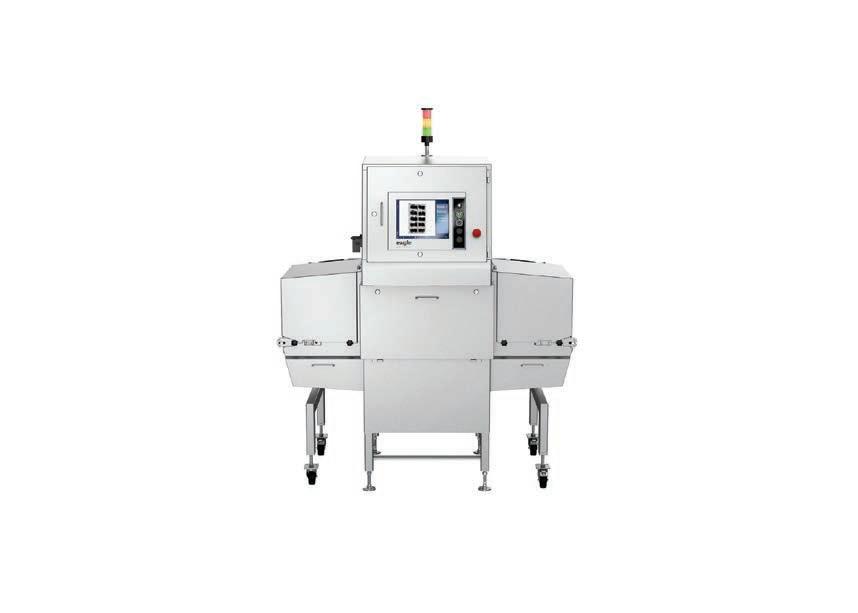





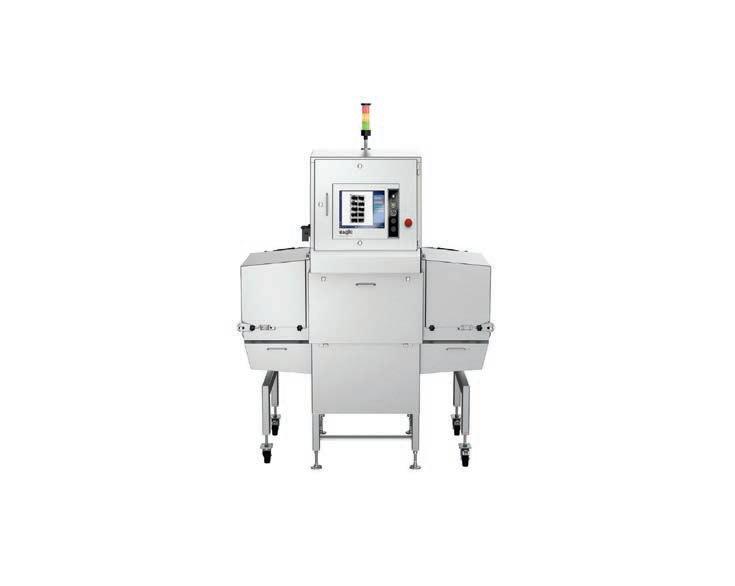


According to Dundas, the Toronto-area terminal will house the newest-generation equipment and a large warehousing space to enable storage of high-quality film and paper laminates, as well as specialty products.
“By having a large inventory of products ready to be slit and shipped, UPM Raflatac can offer customers more flexibility, customization and efficiency in their orders,” Dundas explains. “This also reduces the risk of stock-outs, delays and quality issues that may arise from insufficient warehousing capacity.”
Says Dundas: “UPM Raflatac’s ability to stock more material locally will optimize lead times, enhance service, and help meet the diverse and dynamic needs for our customers in eastern Canada and northeastern U.S.”

NEWSPACK OFFSITE INSPECTION • • metals, bones, stones, glass, aluminum, rubbers, plastic, and standard foreign bodies • mobile services Contact 1-844-XRAY-911 INSPECTION & RECOVERY PARTNER FOR FOOD PROCESSORS xrayreclaim.com | info@xrayreclaim.com | 5 Loring Drive Bolton, ON L7E 1Y1 OFFSITE INSPECTION bones, stones, glass, aluminum, rubbers, standard foreign bodies services 1-844-XRAY-911 (9729) INSPECTION & RECOVERY PARTNER FOR FOOD PROCESSORS xrayreclaim.com | info@xrayreclaim.com | 5 Loring Drive Bolton, ON L7E 1Y1 OFFSITE INSPECTION • • metals, bones, stones, glass, aluminum, rubbers, plastic, and standard foreign bodies • mobile services Contact 1-844-XRAY-911 INSPECTION & RECOVERY PARTNER FOR FOOD PROCESSORS xrayreclaim.com | info@xrayreclaim.com | 5 Loring Drive Bolton, ON L7E 1Y1 OFFSITE INSPECTION • • metals, bones, stones, glass, aluminum, rubbers, plastic, and standard foreign bodies • mobile services Contact 1-844-XRAY-911 (9729) INSPECTION & RECOVERY PARTNER FOR FOOD PROCESSORS xrayreclaim.com | info@xrayreclaim.com | 5 Loring Drive Bolton, ON L7E 1Y1 CPK_XrayReclaim_May23_CSA.indd 1 SUSPECT FOREIGN MATERIALS X-RAY INSPECT & RECOVERY 3rd Party Rework Services for Food Products OFFSITE INSPECTION • • metals, bones, stones, glass, aluminum, rubbers, plastic, and standard foreign bodies • mobile services Contact 1-844-XRAY-911 (9729) INSPECTION & RECOVERY PARTNER FOR FOOD PROCESSORS xrayreclaim.com | info@xrayreclaim.com | 5 Loring Drive Bolton, ON L7E 1Y1 Separation bolt

The sustainable alternative to shrink film packs
Krones Machinery Co. Ltd., +1 905-364-4900, sales@kronesusa.com, www.kronesusa.com
PET bottles and cans packaged without plastic? No problem with the renewable, paper-based packaging solution LitePac Top from Krones!

Global paper and packaging products group Mondi plc has officially completed its acquisition of the Hinton Pulp mill in Alberta from West Fraser Timber Co. Ltd. in a transaction valued at US$5 million. Headquartered in Weybridge, U.K., Mondi says it intends to invest in the mill to improve productivity and sustainability performance and— subject to pre-engineering and permitting—invest in expanding the facility primarily with a new kraft paper machine, which will integrate its paper bag operations in the Americas region to support future growth. With annual production capacity of around 250,000 tonnes
of pulp, the Hinton Pulp mill will provide Mondi with local, highquality fiber from a well-established wood basket as part of a long-term partnership with West Fraser. According to Mondi Group’s chief executive officer Andrew King, “We are delighted to welcome our new colleagues from Hinton Pulp mill to Mondi and look forward to working together to secure the mill’s future and support Mondi’s growth in North America with our portfolio of sustainable packaging.”

Elk Grove Village, Ill.-based robotic systems integrators TM Robotics has formed a strategic alliance with iAutomation of North Attleborough, Ma., for the distribution of Shibaura Machine (formerly Toshiba Machine) robots along the U.S. East Coast region. According to
iAutomation, the partnership significantly enhances its product portfolio with the addition of Shibaura Machine’s extensive robotics range that includes a large selection of six-axis, Cartesian and SCARA robots—including the newly-launched THE800 and THE1000 models—along with robot programming and 3D vision software. “Our team is very excited about this opportunity to offer Shibaura Machine to our customers,” says iAutomation’s vice-president of sales Kathy Cesca. “This partnership will allow us to leverage our current product offering and engineering experience to bring our customers the best solutions in the market.” According to TM Robotics, it is currently the only industrial automation company in the U.S. that offers a comprehensive range of all three major categories of robots, comprising six-axis, SCARA and Cartesian units that are all designed and built in-house by Shibaura Machine.
Leading Italian packaging machinery group Coesia has completed the

acquisition of Davisburg, Mich.based Automation & Modular Components, LLC. (AMC) manufacturer of conveyors and intelligent of material handling automation systems—through Coesia’s FlexLink subsidiary. According to Coesia, the acquisition will enhance FlexLink’s presence on the U.S. market—especially in the competitive battery sector requiring combined assembly or production process with a multitude of heavyweight and lightweight material handling applications. “We consider AMC an important strategic asset for further development of FlexLink, whose robotic and material handling expertise will be enhanced and expanded by AMC’s heavyweight conveyance systems,” says

NOTES & QUOTES Revolutionize Quality Control with ICON X-ray. Canada's ultra-hygienic contaminant detection solution that ensures unrivaled brand protection for food manufacturers. LEARN MORE ABOUT THE ICON X-RAY ONLINE CANADIAN MADE & SUPPORTED *Disclaimer: Construction and features are subject to change.
Alessandro Parimbelli, chief executive officer of Coesia. “The introduction of AMC into Coesia’s portfolio in the United States will enhance the organization’s capabilities and allow the group to continue on its path to being a dominant solutions provider in the automation industry.”
Leading Canadian paper and tissue products group Cascades Inc. of Kingsey Falls, Que., has announced the permanent closure of its currently idled corrugated medium mill in Trenton, Ont., along with plans to wind down its converting operations in Belleville, Ont., and Newtown, Ct., by May 31, 2024, as part of “an operational realignment and optimization” of the company’s Containerboard Packaging platform. The annual production capacity of the equipment to be shut down is 175,000 short tons of corrugated medium and 500 million square feet of corrugated packaging. “Following recent strategic investments in the Bear Island mill and its converting network, production from these facilities will be moved to other units with available capacity and more modern equipment,” says Cascades, citing the need to maximize the performance of its assets, the need to reduce higher operating costs, and to replace aging technology as key factors for the restructuring that is expect to impact approximately 310 jobs. “I would like to sincerely thank the Cascaders affected by this announcement.,” says Charles Malo, president and chief operating officer Cascades Containerboard . “We will stand by them through this process, and we will assist in the relocation of those employees wishing to continue working for Cascades at one of our


Leading global manufacturer of digital printing and production Durst Group has engaged the renowned South Tyrolean artist Klaus Pobitzer as its designated Artist in Residence 2024, to create artistic works inside and outside the company’s global headquarters in Brixen, Italy. One of

the first fruits of this collaboration is the Inside-Out installation featuring large-format individual and group portraits of company employees on the interior and exterior walls of the building, along with the technical details of the printing systems used to produce the images. (See Pictures) “The Durst HQ is an iconic and futuristic building that testifies to the importance of the company in digital printing technology, but hardly anyone in the region actually knows what is behind the world’s leading technology manufacturer,” says Pobitzer. “The Inside-Out installation reveals the secret and brings the company’s greatest assets—its employees and technology—to the outside world.” Following the exhibition the hundreds of square meters of installations on the façade of the Durst headquarters will be processed into recycled bags and auctioned off as unique pieces for a good cause, according to Durst. After completing the Brixen project, Pobitzer will also work on a similar undertaking at the company’s Durst Austria branch in Lienz, which is celebrating its 25th anniversary this year.
Cincinnati, Ohio-headquartered packaging equipment manufacturing group ProMach has completed the acquisition of Zanichelli Meccanica S.p.A. (Zacmi), a prominent Italian supplier of filling, closing, and processing equipment for the global food industry, Founded in Parma in 1954, Zacmi has a strong portfolio of filling machines for food and pet food products, seamers for metal cans, and pasteurization tunnels for sterilizing food products, with an estimated 2,500 machine installations to date worldwide. “The addition of Zacmi further strengthens our position as one of the industry’s leading suppliers of filling and process technology,” says ProMach president and chief executive officer Mark Anderson. “It allows us to add key products to
ProMach’s overall packaging equipment portfolio, like food can filling and seaming, and most importantly, it supports our strategic vision of providing customers around the world with complete solutions and support from a strong global partner.”
Hoffman Estates, Ill.-headquartered automation controls and sensors supplier Omron Automation Americas has commenced the relocation of the company’s manufacturing operations in Renton, Wa., to a larger and more modern manufacturing facility in Greer, S.C., where it will resume manufacturing motion controllers and drives, machine vision cameras, and barcode readers and verification systems after completing the move by May of 2024. “We have conducted a thorough search of potential manufacturing locations and have selected a site that can best serve the future needs, competitive pricing, and expectations of our valued customers,” says Mark Sadie, managing director at Omron Automation Americas. According to Sadie, the move reflects Omron’s commitment to its global strategy of multi-site manufacturing and localized production. “With this relocation, we feel confident we can continue delivering the highest level of service and support our customers have come to expect from Omron.”

German flexible packaging product manufacturer SÜDPACK has been recognized with two WorldStar Awards of the World Packaging Organisation (WPO) highlighting the company’s formidable innovation capabilities, including:
• The PurePE tubular bag for the international cheese ripening industry, incorporating a polyethylene-based concept setting new standards in recyclability, material efficiency and in the reduction of carbon footprints by using a film that is 30 µm thinner compared to previous film

structures—making to reduce resource consumption by 23 per cent and the carbon foot-print by 19 per cent, along with certified 96-percent recyclability.
• The PharmaGuard PP-based blister packaging concept offering full recyclability, while enabling significant reductions in water and energy consumption in production compared to the commonly-used PVC/PVdC and aluminum blister solutions, resulting in 47-percent carbon footprint reduction. The PharmaGuard blister-pack’s the base and lidding films are produced in an innovative co-extrusion process that provides feature an outstanding array of characteristics, accruing to SÜDPACK MEDICA, including high transparency and barrier functionality.

Constantia Flexibles, the world’s third-largest flexible packaging products manufacturer headquartered in Vienna, Austria, has signed an agreement to acquire approximately 57 per cent of the shares of the packaging producer Aluflexpack, Swiss-based manufacturer of foil and film packaging for the consumer and pharma markets employing about 1,500 people at 14 manufacturing locations across Europe. “This acquisition fits perfectly in our Vision 2030 strategy to position Constantia Flexibles as a leading flexible packaging player in Europe and globally,” says Constantia Flexibles chief executive officer Pim Vervaat. “The combination of our businesses represents a great strategic and cultural fit [that] will allow us to better serve our customers through an enhanced sustainable product range supported by a fully integrated technology portfolio, while extending our geographic reach.”
March 2024 · CANADIANPACKAGING 11 CANADIANPACKAGING.COM










www.vc999.com · 877-435-4555 · Sales.Canada@VC999.com SMALL BUT MIGHTY OUR NEW COMPACT ROLLSTOCK THERMOFORMER Let VC999 help you create the perfect packaging solution! - www.VC999.com WE’VE PACKED THE FUNCTIONALITY OF A MUCH LARGER THERMOFORMING MACHINE INTO A COMPACT MACHINE ONLY 12 FOOT LONG. • Durable • Efficient • Small Footprint
HEAT OF THE BOTTLE
The new Aesus Bottle

Unscrambler from AESUS Packaging Systems incorporates advanced scrambling and sorting technology designed to enhance operational efficiency, reduce manual labor, and ensure the highest level of precision in the sorting and orienting of bottles. Tailored to meet the rigorous demands of the food, beverage, pharmaceutical, nutraceutical, pet food, vitamin, and chemical manufacturing industries, the Aesus Bottle Descrambler is designed to offers unparalleled efficiency, reliability, and customization capabilities to handle a wide range of container shapes and sizes—from round to square—and materials including PET (polyethylene terephthalate) and HDPE (high-density polyethylene) . Designed for rapid changeovers, the unscrambler boasts a large infeed hopper, an enclosed frame with safety features, and built-in scales for fast set-up adjustments. With operating speeds of 80 to 200 bottles per minute catering to production lines of all capacities, it is a highly versatile and powerful solution for packaging lines of virtually all throughput capacities.
AESUS Packaging Systems

ADJUSTMENT PERIOD
Designed for in-house production of PET (polyethylene terephthalate) plastic bottles to a high and consistent standard, Sidel’s new IntelliADJUST is a smart bottle blowing control system that works within a ‘closed loop’ environment using interferometric sensor technology to facilitate perfect material distribution—resulting in high production uniformity for PET bottles, including those made from recycled PET. Moreover, it enables consistent bottle quality across a range of variable production conditions, such as preform storage, workshop temperature and relative humidity. The addition of Sidel’s Evo-ON software suite, offers aggregation of equipment data and dynamic analytics features to deploy historical and 24/7 real-time analysis— creating a truly ‘smart’ line system for measuring inline bottle thickness, conduct real-time analyses, and adjusts parameters to maintain consistent quality. According to Sidel, the IntelliADJUST offsets any production line variations by using algorithms to identify measured thickness deviations and automatically correct the heating and blowing parameters to ensure consistent quality without any interruptions—all at operating speeds of up to 90,000 bottles per hour.
Sidel
DOWN IN THE DUMPS
The new Tilt-Down Flexible Screw Conveyor System from Flexicon Corporation is mounted on a portable base with a multipurpose hood and an integral dust collector to allow for safe
and dust-free manual dumping from hand-held sacks—as well as discharging from bulk bags—and subsequently transferring material to elevated downstream process equipment and storage vessels at multiple plant locations. Discharging from bulk bags requires the user’s forklift or plant hoist to suspend the bag above the dust hood, allowing the bag spout to be cinched by an iris valve, untied, and then gradually released to prevent uncontrolled bursts of material from the bag. Alternately, the hand-held sacks can be rested on a fold-down support tray, slit open, and manually dumped into the hopper. The flexible screw conveyor features an inner stainless-steel screw of specialized geometry to propel both free- and non-free-flowing bulk materials—including products that pack, cake, smear, seize or fluidize—with no separation of blends. The support boom and conveyor assembly can be tilted down to maneuver through standard doorways and aisles, and around corners for use anywhere in the plant. A low center of gravity maximizes stability during operation and when rolling the unit between multiple processing tasks and washdown stations.
Flexicon Corporation


START TO FINISH
The updated fourth-generation Converter platform from A B Graphic International (ABG) can achieve impressive running speeds of up to 250 meters per minute while effortlessly handing both printed and blank web materials—thereby enhancing productivity and streamlining production cycles—with its flexo technology meeting the highest standards for print quality, registration accuracy and speed. With expanded camera placement options, including the ability to position fleyeVision cameras before or after stripping and adapt web paths, the Converter platform enhances visibility and quality control to ensure impeccable outcomes, according to the company. The highly versatile Converter allows user to run roll-to-roll, roll-to-finished product, or roll-to-sheet, with or without ABG non-stop technology on the unwind or rewind reels. According to ABG, the Converter platform’s full modularity enables effortless customization to meet current and future requirements, providing the flexibility to adapt to evolving industry demands. Additionally, it can be retrofitted with a wide range of ABG modules, making it possible for businesses to expand their offerings without having to invest in a full new machine.
A B Graphic



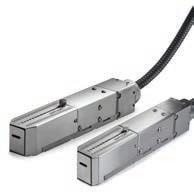
FIRST GLANCE March 2024 · CANADIANPACKAGING 13 The new Hitachi UX2 InkJet Printer-Developed for Tomorrow’s production line Call us today for more details or to book a demonstration 1-877-427-5863 sales@harlund.com www.harlund.com QUICK CHANGE CONNECTORS ON BOARD VIDEO GUIDANCE CLEARER CODES & FASTER SPEEDS LONGER PRINTING CYCLES FIRST IN INDUSTRY SAFE PRINTHEAD CLEAN STATION CPK_HARLUND_SQ_OCT23_MLD.indd 1 2023-09-26 1:50 PM
New demo converting line to display molded fiber benefits
Swedish molded fiber packaging trailblazer
PulPac and its turnkey partner Curt G. Joa (JOA) have completed a successful installation of the cutting-edge Modula converting line at JOA’s plant in Sheboygan Falls, Wis., to demonstrate PulPac’s groundbreaking DMF (Dry Molded Fiber) technology running at full commercial-scale speeds to potential customers trying to reduce their reliance on single-use plastics.
Lauded as a globally viable, cost-efficient, renewable, recyclable and biodegradable alternative to many single-use plastics used for consumer and other packaging, the DMF technology uses significantly less water and energy than traditional fiber forming.
According to PulPac, the DMF process can lower the carbon foot-

print by 80 per cent compared to conventional fiber-forming, while running 10 times faster.
Made available through licensing to packaging manufacturers worldwide, the DMF technology is supported by a growing global partner network that supplies all the required components.
“Seeing the technology and the machinery live is often an eye-opener for people in the industry, and I
am thrilled that we can now showcase the technology and the Modula first-hand to our North American customers,” says PulPac’s chief commercial officer Sanna Fager.
“With locally-based partners, we also expand and simplify customer access to support, know-how, product development, and capacity,” Fager says, crediting the company’s sales partner Seismic Solutions and tooling supplier
TekPak for Modula’s successful North American debut.
“I believe Dry Molded Fiber will revolutionize the way packaging is manufactured and perceived,” says Ryan Brown, business development manager at Curt G. JOA.
“Combining this technology with our engineering know-how and machine-building expertise will benefit the packaging industry, drive sustainability, and help facilitate the shift away from single-use plastics.”
In addition to the high-speed Modula platform (see picture), PulPac has also developed a smaller and more compact Scala machine based on a on a plastic injection machine platform.
“Our goal is to foster a packaging industry where sustainability is no longer a choice but a fundamental principle,” says PulPac’s chief operating officer Viktor Börjesson.
Recyclable canister right on point for vegan oat drink mix
Founded in 2014 in Freiburg, Germany, vegan and nuts-based foods manufacturer Fairfood is celebrating the company’s 10th anniversary with a telling switch to a more sustainable packaging solution for its powdered oat drink.
Boasting an innovative Fairtrade-certified product portfolio that includes hand-roasted organic nuts, vegan nut Bolognese, nutbased vegan organic hot chocolate creams, and organic oat powder drinks, Fairfood’s key brand messaging pillars of fairness and sustainability have been aptly reinforces in the marketplace earlier this year with a switch to the recyclable paper end GREENCAN canisters from leading global consumer packaging manufacturer Sonoco .
While the product was previously packaged in returnable deposit jars to minimize the packaging footprint, it has problems with fully vacuuming those jars, along some product loss and waste.
To overcome these issues, Fairfood switched to Sonoco’s GREENCAN solution, which proved to be an ideal recyclable alternative that also effectively maintains product freshness.
According to company founder and managing director Amos Bucher, the paperboard packaging’s high recyclability and shelf appeal made it the ideal choice.
“We chose GREENCAN for our powdered oat drink because it is made from recycled material and it can be recycled in paper streams,” says Bucher.
“It is also lightweight, resealable,

and therefore practical for our customers,” Butcher notes, adding the GREENCAN solution is helping the company’s brand stand out among plant-based milk competitors in a “booming” market.
Available in multiple shapes and sizes—from round, square or rectangular to oval, oblong or triangular—the recyclable GREENCAN
package is made of 92- to 98-percent paperboard and features a wide range of barrier properties to maintain long shelf-life..
The GREENCAN solution also features an integrated paper lid, so that the whole package can go through the household paper recycling stream without any need to disassemble it.
“With this new partnership we are excited to embark on a thrilling journey of sustainability and innovation,” says Bernhard Straub, sales manager at Sonoco Consumer Europe
“This strategic collaboration will enable us to reach new heights and tap into an untapped market,” Straub proclaims.
“The possibilities are endless, and we can’t wait to see what the future holds for Fairfood.”
14 CANADIANPACKAGING · March 2024 CANADIANPACKAGING.COM
ECO-PACK NOW




PACKAGING INNOVATION DISRUPTORS SUMMIT June 11, 2024 | Toronto Barrett Centre for Technology Innovation Contact Jim Downham @ jdd@leaderlinx.com to become a 2024 Disruptor. SUMMIT2024
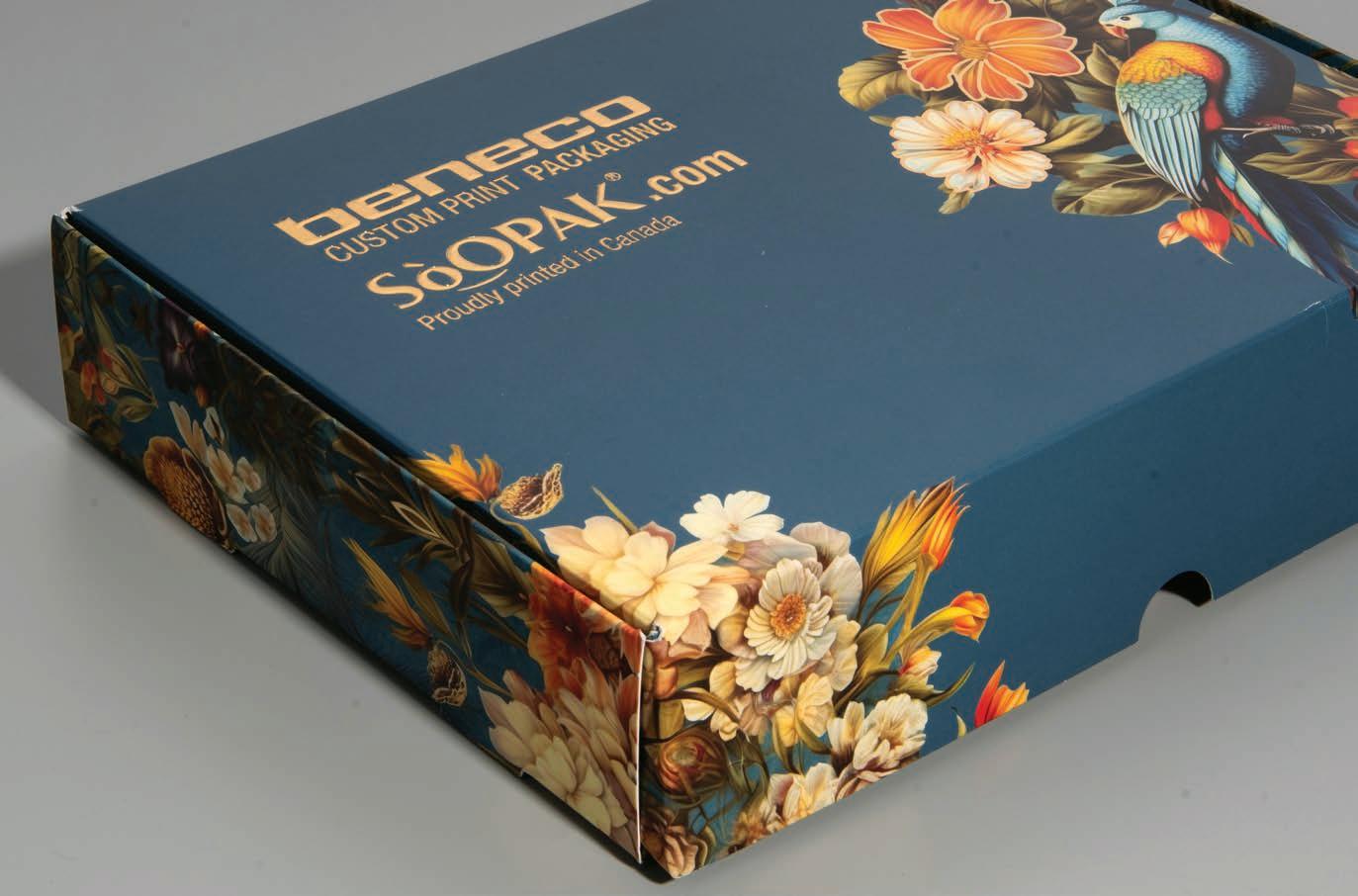
No job is too big or too small for Beneco. We’ve invested in the best Heidelberg printing & converting technology. Their internal machine performance recoding reveals no one else achieves better folding carton output efficiencies than Beneco.
That means lower prices and faster turnaround for you.
And we have more investments coming. Visit our state-of-the-art Cobourg facility.
benecopackaging.com SoOPAK.com
folding carton pricing Quickest turnaround
Best
1-905-677-2888 sales@benecopackaging.com Beneco Custom Print Packaging Call Beneco today for your folding cartons. You want to get your ideas and products to market first.
get that. UV Gloss Coating Foil Stamping UV Matte Coating
We
Automated multihead weighscales positioned on the Etobicoke plant’s upper mezzanine level dispensing precise portions of organic granola cereal to the bagging machines below on the ground floor for packaging.
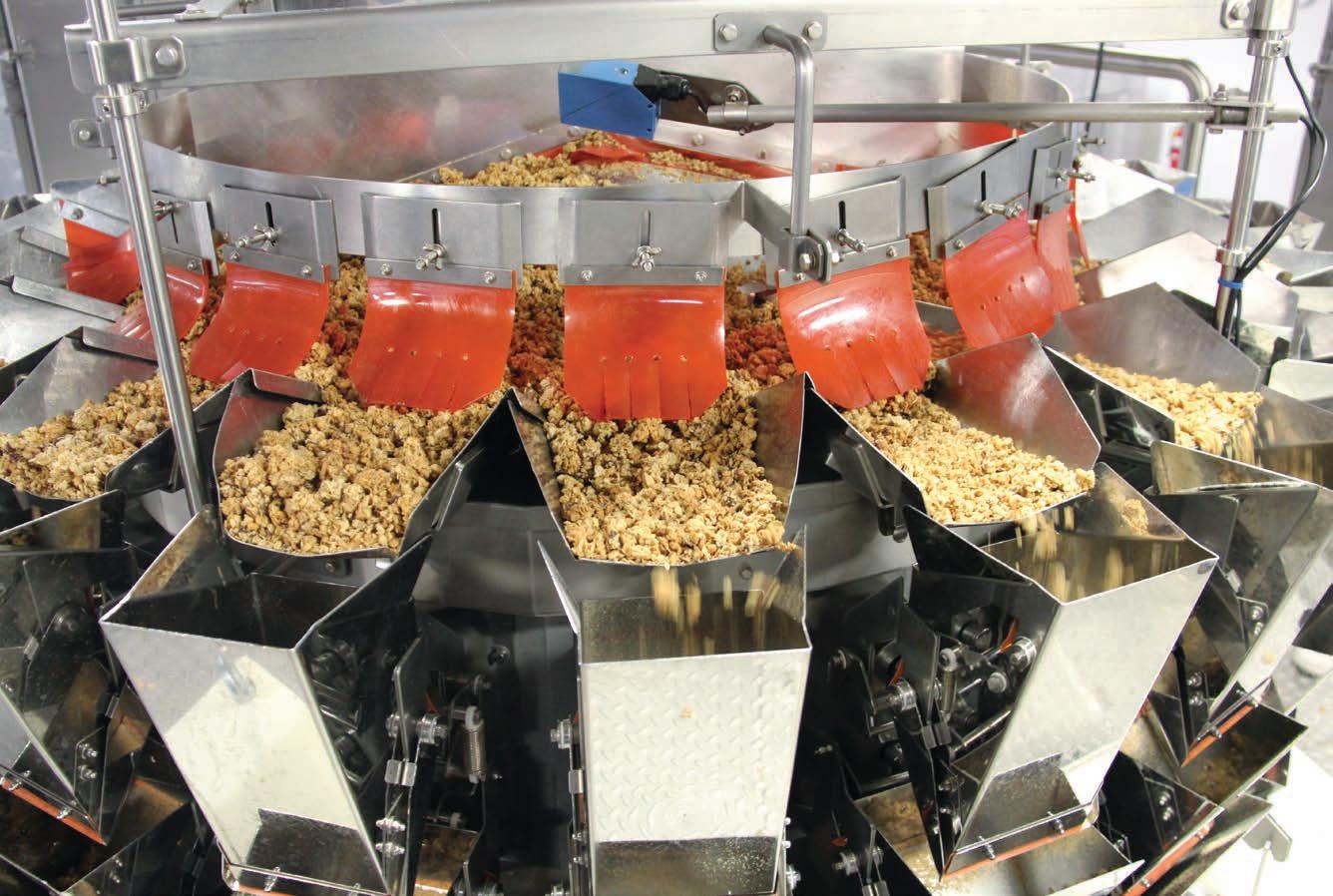
SAFETY FIRST
Natural cereals producer raising its food safety credentials and reputation to the next level with high-performance X-Ray product inspection technology
By Andrew Snook
When Steve “Stephano” Frank and Annette Blaeske founded the Stephano Group in 1978, it stemmed from an entrepreneurial instinct to create a living for their new family, having had arrived to in Canada with next to nothing in their pockets.
Identifying an opportunity in the market for high-end granola products, the couple started up their company in a former bank building in the small town of Killaloe, Ont., in the Ottawa Valley region, and began introducing innovative products to the marketplace soon after.
“They really showed what it is to build a company just through pure grit and relentless hard work, and that’s what we witnessed as kids growing up,” recalls Sean Frank, who currently oversees the second-generation family business alongside his brother, Noah Frank.
“The survival of putting food on the table and working incredibly hard—that struggle was the motivation to make it to the next level.”
By the late 1990s, the Stephano Group had expanded into contract manufacturing for the Canadian manufacturing and retail sectors.
In the early 2000s, Sean and Noah joined their parents’ business and began learning the ins and outs of the operation.
With an eye to expand further into larger markets where they could take on private label and contract manufacturing for the company’s high-quality granola products, Stephano Group relocated to Toronto in 2009, with Sean taking on the role of chief executive officer and Noah taking on the title of president.
By 2017, the company was operating out of its current headquarters in Toronto’s west-end suburb of Etobicoke.
“Originally, the concept was to provide fresh natural breakfast and snack products, which were delivered directly to local markets,” explains Noah.
March 2024 · CANADIANPACKAGING 17 CANADIANPACKAGING.COM
COVER STORY
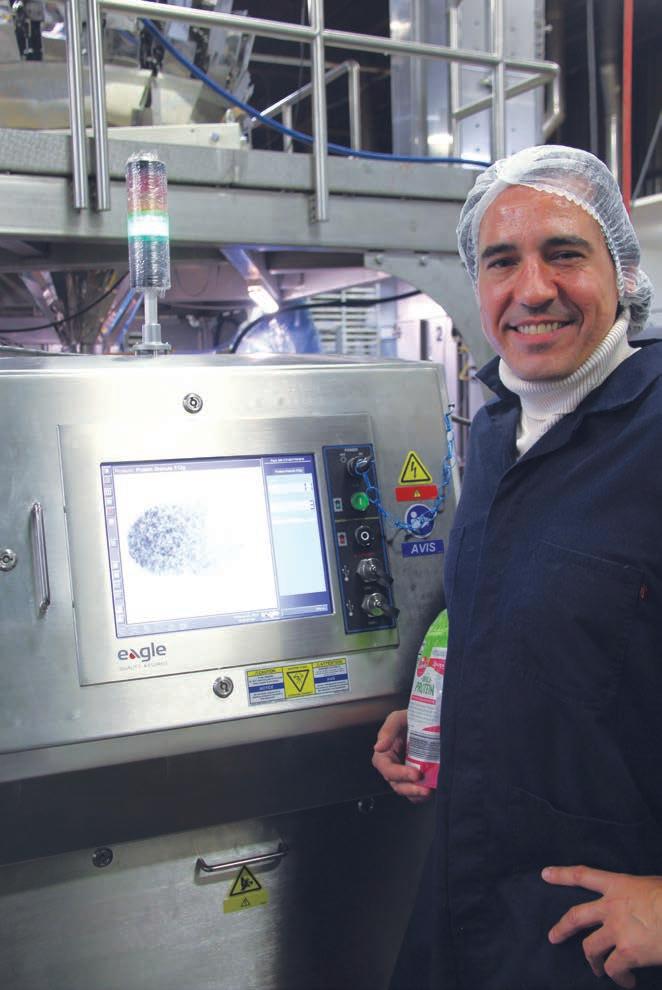

“The business has grown to be a midsize producer of breakfast and snack products with private label and co-manufacturing partners across North America.”
While granola remains the company’s most popular product, Stephano Group also produces several other products like hot cereal mixes, oatmeals, nutrition bars and various snacks.
“Granola has been our main thing over the years and it still holds the largest percentage of production,” relates Sean, “but we have added several types of bar lines, oatmeal packets, compression forming and, most recently, traditional cereals similar to Cheerios and Rice Krispies.
“We also run a full complement of packaging machines supporting all major retail formats.”
The company currently operates two production facilities in Etobicoke and Mississauga, Ont., with a total of 80,000 square feet of manufacturing space.
The two plants house a total of 18 production lines including granola, cereal, bars, oatmeal, compression forming and extrusion, with end-to-end processing that includes blending, batching, baking and packaging.
In total, Stephano Group employs approximately 190 people.
(Below)
A plant employee unloading trays of bulk product from the mobile racks used to transfer finished cooked product from the processing area to the plant’s packaging line.
The main plant operates on a six-day weekly schedule with five double shifts and a cleaning day, while the secondary plant runs a five-day schedule, with four single shifts and a cleaning day.
Since secondary plant is also dedicated to producing school-safe products, the whole operation is free from that five major food allergens consisting of peanuts, tree nuts, eggs, dairy and gluten.
As every successful company active in the food manufacturing space knows well, food safety must always be a top priority.
And with the company making its living in a highly competitive and crowded market, Sean knows that product quality and safety are vital for the company to remain to remain successful.
“We’re “AA” BRCGS certified,” he points out. “Quality is Number One in everything we do, it’s our focus— that and having the highest safety standards.
“We stand behind everything we produce,” Sean says, “because it is a competitive market.
“The RFQ (request for quote) process means we’re bidding against another producers, so there’s definitely always competition on contracts.”
As Sean relates, Stephano Group’s facilities have also obtained all-important organic, gluten-free, non-GMO project and Kosher certifications, and the company is periodically audited by authoritative certification groups like
18 CANADIANPACKAGING · March 2024 CANADIANPACKAGING.COM
(Left)
Stephano Group’s chief executive officer Sean Frank strikes a happy pose in front of the Eagle Pack 320 PRO X-Ray product inspection system recently purchased from PLAN Automation to meet the food safety requirements mandated by leading mass merchdiser Costco, which is one of the company’s largest customers.
COVER STORY
SGS International, NGP, and Ecocert Canada
Not surprisingly, investment in research and development is a key part of how Stephano Group stays competitive.
“We’ve been really strong on R&D,” Sean proclaims. “We put a lot into creating amazing products to have an edge with the quality, taste and texture.
“We make sure that the overall food safety and product quality is followed through to the last step so that the product meets the needs for the customer.”
The company also regularly invests in learning about the latest processing and packaging technologies that can help it optimize various aspects of its operations.
Stephano Group’s most recent investment was an Eagle Pack 320 PRO X-ray machine, supplied by prominent line integration services provider PLAN Automation out of its head office in Bolton, Ont.
As Sean recalls, Stephano Group’s relationship with PLAN Automation started about 10 years ago when the company was looking to purchase metal detectors for its production lines.
“I have a pretty long history with PLAN Automation,” Sean says. “I’ve known them for 10 years and I’ve really had a good experience with that relationship.
“They stand behind their products,” he sates. “Working with them is just a really good experience overall.”
While metal detectors do a good job enhancing safety on Stephano Group’s production lines, X-Ray detection recently became a safety requirement for one of the company’s biggest clients.
“Costco is now requiring it, so I compared diligently what X-ray machines were in the market,” Sean says.
“Given my good history of working with PLAN Automation, I felt that their machine was more robust than their competitors,” he says. “They also sold me on the idea of a stronger local support, so I awarded them the business.”
While Costco is the first of Stephano Group’s clients to make X-ray technology a safety requirement, Sean says it’s a trend that is expected to grow in the food production industry.
“While this was related to being able to do business with Costco, it has come up with a couple other customer requests,” he says. “Our food safety critical control point is fine with metal detection when dealing with our ingredients, but it came up as a requirement to add an extra layer of food safety to catch items like a stone, or other foreign objects that a metal detector can’t detect.”
While the initial purchase price of an Eagle brand X-ray machine might be higher than some of the competing brands, the overall cost of ownership

“It’s important to create an equitable and comfortable work environment by treating everyone with respect and making it a really enjoyable place to work.”


March 2024 · CANADIANPACKAGING 19 CANADIANPACKAGING.COM
(Right)
A side view of the high-performance Pack 320 PRO X-Ray product inspection system manufactured by Eagle Product Inspection and distributed in Canada by PLAN Automation.
(Bottom)
Machine operator Karll Andrew Pacpaco keeping a close eye on the touchscreen display of the Pack 320 PRO X-Ray machine to determine the exact location of a detected contaminant, which is pinpointed via a red dot (inset) generated inside the live image of the contents inside a finished bag of product.



over next 15 years is more important, notes Mat Bédard, vice-president and chief operating officer of PLAN Automation.
“The Eagle X-ray systems have been designed to have the lowest cost of ownership of any brand of X-ray machine,” Bédard says.
“For example, the generator on the X ray is designed to last over 60,000 hours, which is massive,” he points out. “With a lot of the competition is more like 10,000 to 15,000 hours, and then you’ve got to change the generator.
“So, it’s designed to last six to eight times longer than any other competitors out there.”
Manufactured by Eagle Product Inspection in Tampa, Fla., the Pack 320 PRO is a high-performance X-ray system designed for precise inspection of small- to mid-sized packaged products on high-throughput packaging lines, including packaged goods in cartons, pouches, cups, tubs, trays and other packaging up to 215-mm in height.
It can handle throughput speeds ranging from 17 to 119 meters per minute, depending on package type and dimensions.
The unit offers a variety of detection modes including contaminant, missing item, clip, void and premium, plus modes for mass/weight, shape/position, fill level and filler feedback.
The Pack 320 PRO can also perform multi-lane inspections with a wide variety of rejects and due diligence monitoring packages.
This includes the Eagle Repository, supplied as standard, which provides a simple way of storing, viewing and transferring production information such as statistics, event logs, manually saved images and reject images to other devices for storage.
For its part, ther Eagle Remote Access enables product set-up, machine diagnostics, and remote correction by PLAN Automation or Eagle technical support to maximize machine uptime.
Another advantage of purchasing an Eagle X-ray system from PLAN Automation is the service and parts support that the company provides.
“We’ve got a team of 12 factory-trained X-ray technicians as part of my team,” Bédard says. “We have $500,000 in spare parts in our locations in B.C., Alberta, Ontario, Quebec and Nova Scotia. And we have over $2 million in X-ray equipment available in stock at all times.
“We provide a support guarantee of 12 to 24 hours from a phone call,“ Bédard adss. “We will fix your machine within 12 to 24 hours, or we will give you a rental machine at no charge.
“That’s a massive advantage.”
In addition to selling inspection
20 CANADIANPACKAGING · March 2024 CANADIANPACKAGING.COM
(Right)
A suspected contaminated bag of product is automatically taken off the line by the Pack 320 PRO X-Ray detection system and placed onto the reject belt for evaluation and rework.
(Below)
COVER STORY
The Etobicoke plant’s end-of-line packaging area employs the model WF20 case former manufactured in Canada by Wexxar Bel, and expertly integrated into the high-speed packaging line by PLAN Automation.

equipment, PLAN Automation also offers various ownership options—including short- to long-term rentals and lease-to-own financing—along with emergency rework and recovery services.
When planning for the future, Sean says innovation in the company’s products and the latest technologies will be key to continuing to build on the success of Stephano Group.
“Our vision is to be a market leader for natural cereals and snacking products in North America,” Sean states.
Over the years, Sean and Noah have worked every job within the production facilities, so the two brothers have full respect and understanding for the importance of investing in reliable staff to build towards a bright future.
“When we started it was just us side-byside making the product, packing it, and loading it onto the truck,” Sean recalls.
“A few years ago, we became too busy in the office to be on the production lines much, but we’ve done all the jobs that everyone is doing out there,” he says.
“It’s important to create an equitable and comfortable work environment by treating everyone with respect and making it a really enjoyable place to work,” Sean says.
“You walk our floor, and everyone is smiling and feeling good about being there.
“As much as we want to build a successful company,” he concludes, “we want to do that through being fair with our employees and creating a good work environment for them.”
SUPPLIERS
Plan Automation Eagle Product Inspection



March 2024 · CANADIANPACKAGING 21 CANADIANPACKAGING.COM
(Clockwise from top)
The Movitrac LTE B frequency inverter from SEW-Eurodrive used to control conveyor speeds on the plant’s busy production lines; a bird-eye’s view of the plant busy processing and product transfer area; a close-up of the product image of a bag’s contents displayed on the Pack 320 PRO X-Ray detector’s touchscreen interface; a close-up view of the stainless-steel buckets and dispensing chutes incorporated into the automatic weighscales’ design.


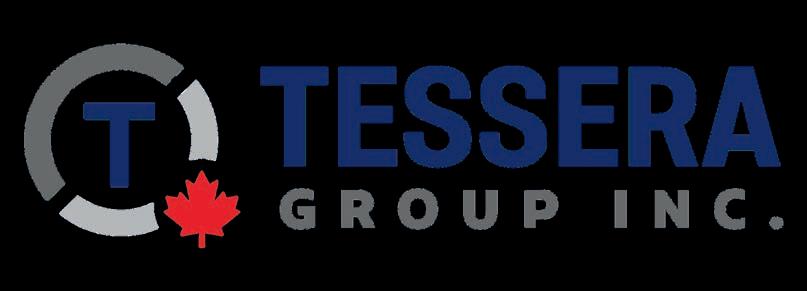



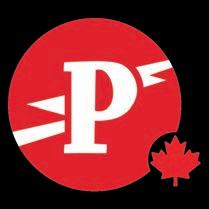

Turnkey Automation Solutions Design Engineering Equipment Controls Parts Service Consumables Conveyance tesseragroup.com
UNITED THEY STAND
Three-way
merger creates a new Canadian packaging automation powerhouse
The notion that the whole is often bigger than the sum of its parts is a common theme in the North American packaging industry, whose customers are increasingly demanding their suppliers to provide holistic solutions to their automation and other needs, rather than individual pieces of machinery and components.
Here in Canada, the move towards one-stop sourcing has been underscored in recent years with some robust M&A (mergers and acquisitions) and joint venture activities—resulting in creation of some brand new corporate entities like the Tessera Group.
Formed in 2022 by merging leading brands MD Packaging (MDP), George A. Wright (GAW), Penmar Automation (PA), Bluewater Automation (BWA) and Tessera Integration, the rebranded company is for all intents and purposes a marriage of equals that offers unique turnkey solutions to the consumer packaged goods industry (CPG) and industrial markets.
With a move to new corporate headquarters in Port Perry, Ont., scheduled for completion next year, Canadian Packaging has recently reached out to the company’s chief executive officer Jaime Alboim to explain how this threeway merger will benefit Canada’s packaging industry customers and clients.
QPlease provide a brief history of Tessera’s founding companies and how the whole idea of the merger came together.
AFormed in 1989, MD Packaging became one of Canada’s most established packaging automation suppliers, representing some of the industry’s leading OEMs (original equipment manufacturers) and providing service, support and parts across Canada.
Founded in 1994, George A Wright Toronto (GAW) is a full-service, custom material handling manufacturer who design, engineer, fabricate and assemble multiple styles of conveyor, mezzanines, custom solutions, etc., sold to some of the largest industrial processors, while also supporting a number of Top Tier OEMs with material handling solutions.
Finally, Penmar Automation started out in 1991 and by deploying proprietary press brake safety upgrades. Today they design, engineer
Right: Tessara Group’s highly-skilled technicians working on completing a new incline conveyor installation.
 Above: Jaime Alboim, Chief Executive Officer, Tessera Group
Above: Jaime Alboim, Chief Executive Officer, Tessera Group

We represent many brands, some of whom are exclusive with us in Canada and others are longterm partners where we may not have exclusivity, but still have phenomenal working relationships.
For their part, GAW has its own brand of conveyance equipment, being an OEM, and so does Penmar.
and manufacture everything from their own panels/control systems to collaborative and standard robotic cells.
Our ownership group had been working together for years supplying automation lines and relying on each other’s expertise. Over time, our groups became closer and closer, until it made sense to join forces and create one larger company, so that we could control the process as one unit.
QPlease explain the corporate structure of the new entity and the extent to which all these partner companies are integrated.
AWhile we operate each brand as its own entity, many of the standard functions are now multi-branded, whereby the human resources, marketing, finance, operations and other departments now manage all brands under one umbrella.
The brands have their own autonomy to operate but where it makes sense, we have the ability to pull resources where needed.
We have four owners, each with an equal share of the group, which in addition to myself include CTO (chief technology officer) Jake Constantine, COO (chief operating officer) , Tom Meikle, and CFO (chief financial officer) Brett Payne.
QWhat are the merged company’s key brands and product lines, and who are your key customers?
AOn the MD Packaging side of the business, our key partners include Pearson Packaging, Thermo Fisher Scientific, Universal Labeling, Enercon, Matrix Bagging, MPAC and Belcor/Wexxar/Ipak, to name a few.
We are a licenced Fanuc robotics integrator, and we work with a number of very well established core component brands.
Our customers range from small, independently-owned companies to the Fortune 500-listed enterprises, and everything in between.
Because our brands each focus on a particular piece of the puzzle, we can offer truly turnkey lines from concept to field installation, including design, engineering, fabrication, assembly, sales through to installation/commissioning, aftermarket parts, and consumable programs—done in-house and controlled by our group.
When you control the process, you can control the outcome. We very rarely have to outsource, which means that customers can expect that the buck truly stops at our group.
QWhy did the company choose to centralize its operations in Port Perry?
AWe currently have three facilities in the GTA (Greater Toronto Area) region, including one for MDP in Uxbridge, Penmar in Newmarket and GAW in Scarborough.
We needed to find land to build our new headquarters, and as most of our manufacturing staff live in the Durham Region, we decided on Port Perry. The town and region have been phenomenal to work with and our team live in close proximity. We felt we needed to amalgamate our groups into one so we can continue to focus not only on the process, but also on the culture.
We have over 100 people now at Tessera and while many are field staff, it was vital that every process was under one roof. The new building
March 2024 · CANADIANPACKAGING 23 CANADIANPACKAGING.COM SPONSORED CONTENT
CONTINUED ON PAGE 39


CANADIAN OWNED AND OPERATED FOR OVER 30 YEARS
EXPERTS IN PRODUCE PACKAGING

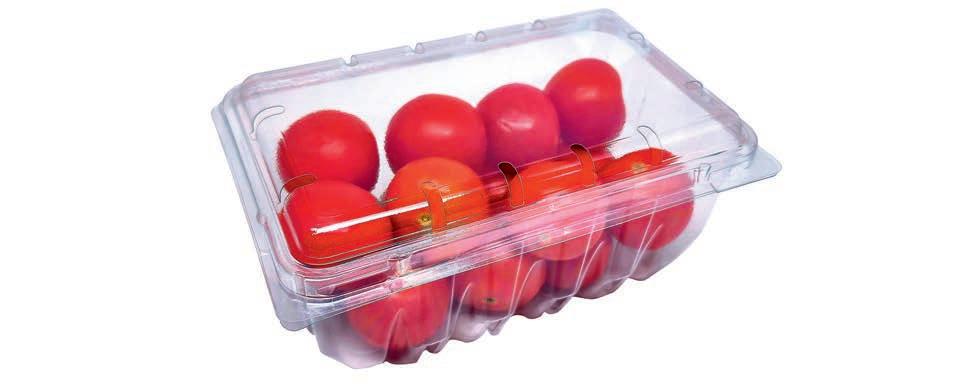
Canpaco, Canada’s leading vertically integrated manufacturing/distributing packaging company, brings its expertise to the produce industry. Our unique film and paperboard converting/printing capabilities, coupled with stock release programs, differentiate Canpaco from all others.
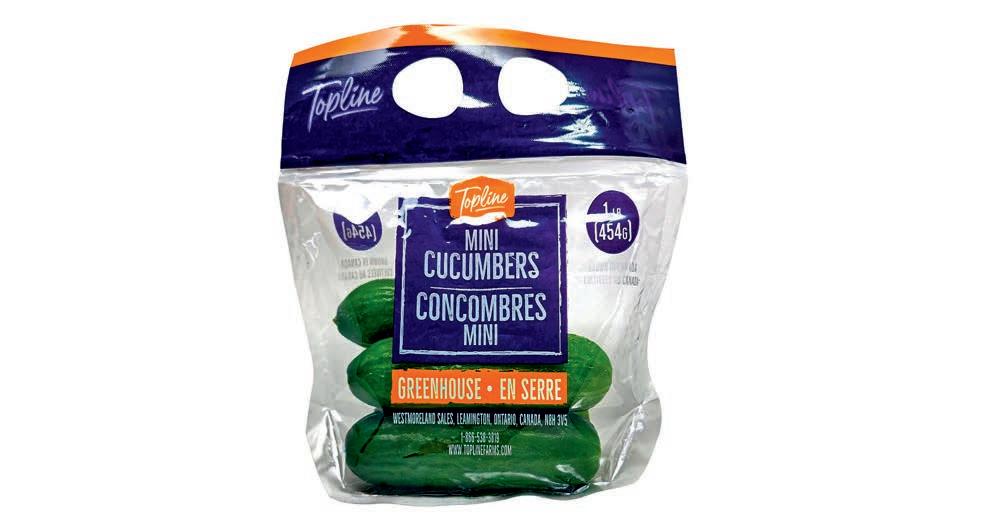
We specialize in shelf life extension, technologically, advanced films, and leading packaging equipment. Utilizing the latest technology in shipping and inventory control, with multiple warehousing facilities and state of the art in-house logistics, we service coast to coast. Canpaco stands ready to meet and exceed all your produce packaging requirements.
Phone: 905-771-7791






E-Mail: sales@canpaco.com
Web: www.canpaco.com


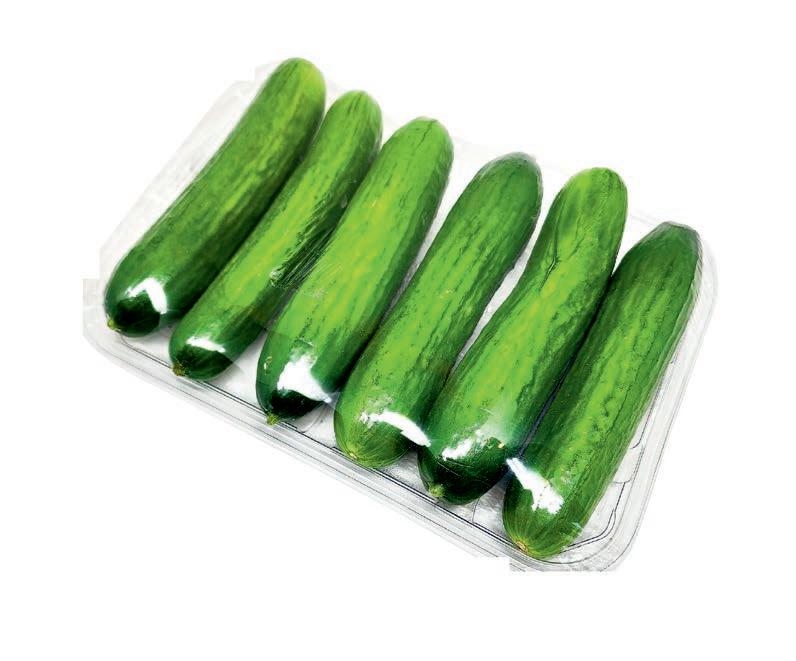
GROW WITH US!
West Coast hospitality to provide a perfect backdrop for annual CPMA Convention and Trade Show
While the growing season may have already started in some parts of Canada benefiting from a weirdly warm El Niño winter, next month’s annual CPMA Convention and Trade Show of the Canadian Produce Marketing Association (CPMA) in Vancouver will provide a perfect formal launching pad for an industry facing numerous challenges on many fronts.
Running at the Vancouver Convention Centre April 23-25, 2024, it promises to be an exhilarating celebration of the Canadian produce industry for the growers, shippers, packers, importers/ exporters, brokers, wholesalers, retailers, distributors, foodservice operators and all the other key links in the country’s produce supply chain.
With a trade show featuring over 600 exhibit booth from more than 270 participating companies, CPMA Convention and Trade Show is by far the largest fresh produce event in the Canadian industry—providing a unique opportunity for industry leaders to enhance existing relationships and develop new business opportunities in Canada.
According to the Ottawa-based CPMA, “Our show regularly attracts key decision-makers and customers from all segments of the fresh produce supply chain.
“Participants include industry executives, category managers, government representatives, and countless other notable staff who are actively involved in the Canadian fresh fruit and vegetable sector.”
As always, the event is expected to a large contingent of foreign visitors looking to tap into the many business opportunities in the Canadian and North American produce markets.
In fact, at the 2023 CPMA trade show foreign exhibitors accounted for just over a half of all exhibits—validating the event’s strong international profile.
In addition to the trade show, atten-

dees will benefit from the priceless market insights and intelligence they can obtain from taking in the highly informative Learning Lounge conference sessions that will include:
Traceability – FSMA 204 and SFCR – Bilateral Compliance for Industry
Wednesday, April 24
3:45 pm – 4:15 pm
First, there was Part 5 of Canada’s Safe Food for Canadians Regulations addressing Traceability, then the U.S. FDA introduced FSMA (Food Safety & Modernization Act) 204 Food Traceability Rule. For much of the produce industry, the need for regulatory compliance in both Canada and the U.S. is a reality. Join industry leaders, including Andy Kennedy, who helped FDA develop FSMA 204, in this session to help the industry understand the similarities and differences between the two and support efforts toward compliance for both.
Women in Produce –Mentoring: Everyone Benefits
Thursday, April 25
12:30 pm – 1:00 pm
Mentors inspire, motivate, have real-life experience, offer constructive feedback, hold you accountable, expand your network, and can make a significant difference in your career trajectory. Ask a young woman in the industry about mentorship and she is certain to note its importance. But it is a two-way street: senior female mentors also benefit from enhancing their leadership skills and from personal satisfaction and fulfillment. Women from across the supply chain will talk about the role mentorship played in their careers, the qualities to look for in a mentor, and how you can become a mentor for someone looking for helpful mentorship.
Growing in Produce –Attracting and Keeping Emerging Leaders
1:15 pm – 1:45 pm
Young professionals are helping to change the perspective of businesses by introducing new approaches and solutions, openness to diversity and inclusion, and adaptability that can strengthen an organization. To attract and keep this new talent, companies need to understand their priorities and be ready to adapt if necessary. In this session, emerging produce leaders will speak about their produce journeys, what motivates them, and what they expect from their employers.
Produce Transportation –Elements of Success
2:00 pm – 2:30 pm
In this session, you will gain valuable insights into preventing and managing transportation-related disputes that arise from conveying fresh fruits and vegetables into and within North America. There are many components that go into the successful movement of produce— including temperature, maintenance and recorders, reefer unit downloads, transit times, loading patterns, etc.—that can have an impact on liability in the event of an incident. The Fruit and Vegetable Dispute Resolution Corporation will help participants understand this complexity, while those engaged in produce transportation will speak to practical implementation and what can go wrong.
Consumers’ Laser FocusA Buyer’s Perspective
2:45 pm – 3:15 pm
The news and social media are full of articles and conversations around the cost-of-living challenges facing Canadians—whether it’s the impact of interest rates, the housing shortage, or the increase in costs of items consumers buy daily. Perhaps no issue has received as much attention, and consumer concern, as the cost of food. Retailers from across Canada will provide insight into changes in consumer buying they are seeing, their strategies to enable Canadian consumers to continue to have access to healthy, affordable fresh produce, and their predictions for the coming year.
To register for the event online, please go to: convention.cpma.ca
Attendees will also have access to all the key social and networking events, including a keynote session featuring, Cassie Campbell-Pascall, one of the greatest female hockey players in Canadian history; business sessions and delegate lunch featuring a panel of international retailers and foodservice buyers; and social networking events such as the Chair’s Welcome Reception , CPMA’s After Party , Women in Produce and Young Professionals receptions, and the Annual Banquet.
March 2024 · CANADIANPACKAGING 25 CANADIANPACKAGING.COM PRE-SHOW REPORT
The annual CPMA Convention and Trade Show routinely features hundreds of exhibits by leading Canadian and international produce industry players and their suppliers, while drawing many senior industry executives, category managers, government officials and other influential decision-makers.

READY TO RESIST
Canadian fresh produce industry faces an anxious year ahead in run-up to the federal ban on single-use plastics
Living in interesting times is nothing new for the Canadian Produce Marketing Association (CPMA ), one of the country’s strongest and most influential industry groups that’s been around for a remarkable 99 years.
But even accounting for that longevity, it is fair to says that it’s been some time since the venerable Ottawa-based association’s relatively large and highly di-
verse membership—accounting for about 90 per cent of all fresh vegetable and fruit sales in Canada—has faced the sort of grave existential challenge to its future prosperity as implementation of the pending federal ban on single-use plastic packaging.
While the ban may or may not be good politics for the federal Liberal government struggling in the polls, it is an exceptionally bad policy at the worst possible time and for all the wrong reasons, according to CPMA’s long-time president Ron Lemaire.
“If you were to eliminate plastic packaging from our supply chain for fruit and vegetables, the cost of these products to the consumer would rise by 34 per cent, along with a 50-percent rise in food waste and 50-percent rise in greenhouse gas emissions,” says Lemaire, citing CPMA-collected data and research.
“On top of that you would have total elimination of the entire categories of value-added products like fresh-cut salads and pre-cut produce, which would lead to lower overall consump-
tion of fresh produce,” according to Lemaire.
Such outcomes would be absolutely devastating for a critically vital food category that has experienced some of the highest price increases recorded during the dangerous inflationary spiral unleashed in the wake of the COVID-19 epidemic.
For an industry struggling to come to grips with extraordinary operating cost rises throughout its entire supply chain, adding the burden of replacing all of its existing single-use plastic packaging with entirely new and largely untested alternatives would be a missive blow to its fledgling recovery, Lemaire asserts.
The biggest problem with the government approach, Lemaire says, is its tendency to look at the different sectors impacted by the pending ban—scheduled to come into effect at the end of 2025—in isolation rather than in the context of the country’s highly-integrated food distribution system, where any radical changes to existing and long-established industry practices will reverberate through other food sectors.
26 CANADIANPACKAGING · March 2024 CANADIANPACKAGING.COM CPMA OUTLOOK
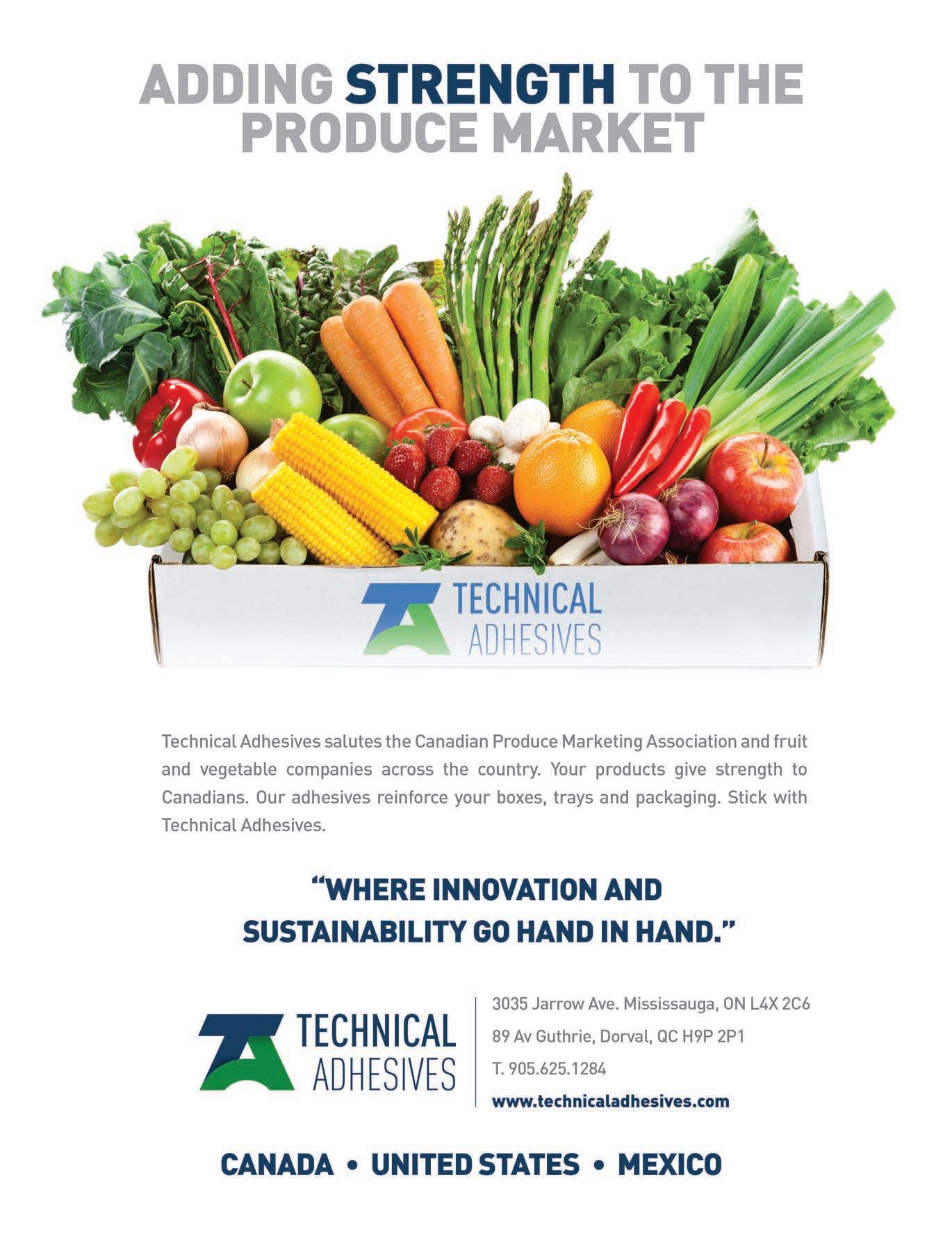
WE
RIGHT-SIZE
AND BRAND YOUR PACKAGING TO FIT YOUR NEEDS.

Packaging based on what you need to put inside and that protects it on its way to its destination. No over-packaging. No one-size-fits-all. Durable. Customizable. Sustainable.
Learn more about Canada’s corrugated industry at cccabox.org
Says Lemaire: “Food inflation is a complex system that needs to take a holistic integrated approach to change.
“You cannot look at one singular element within the food system and change one piece to find a solution for everything,” he states.
“So any change to our [produce] packaging strategy will dramatically impact the availability of product, the cost the product, and food security in our country.”
As Lemaire points out, the runaway food inflation in the fresh produce category has already manifested itself in lower consumer sales and demand due to the rising prices and production costs, which will ultimately have an adverse effect on the consumers’ health and nutrition.
“After the pandemic, we have seen food inflation impacting our sector in a big way,” he says, “with consumption declining through most of last year, before a slight rebound at the end of 2023.
“We’re hoping that 2024 will show some notable consumption growth to bring us back to where we were before
the pandemic, which is just under four servings of fruit and/or vegetables per day.
“Ideally we would like to see it rise to between four and five servings a day,’ says Lemaire, while acknowledging that the price of fruits and vegetables still has to come down a fair bit to make that goal realistic.
“You cannot look at one singular element within the food system and change one piece to find a solution for everything.”
However, that goal will become a lot more elusive if the government proceeds with the implementation of its single-use plastics ban by the end of next year.
Not only would this continue to fuel further public anxiety over food security and affordability, Lemaire says, but it
 Ron Lemaire, President, CPMA
Ron Lemaire, President, CPMA
would also have major economic repercussions for a key Canadian economic growth engine that contributes about $15 billion to the country’s GDP (Gross Domestic Product) each year, while providing full-time jobs for an estimated 185,000 Canadians.
Simply replacing plastic with paperbased materials is not the answer, Lemaire asserts, noting that the cost of fiber-based packaging for price industry application increased by 27 per cent over the last year.
“The cost of all the major production inputs in our sector are all at higher-than-normal levels,” he says, “and these things all play into the end price of food for consumers at the retail level.”
The biggest irony of the current situation, according to Lemaire, is that the amount of plastic packaging found at the grocers’ produce departments accounts for just 2.9 per cent of all plastic packaging in Canada, which makes the government’s move to ban all single-use plastic in the sector a disproportionately punishing policy.
“It’s a drop in the bucket compared to
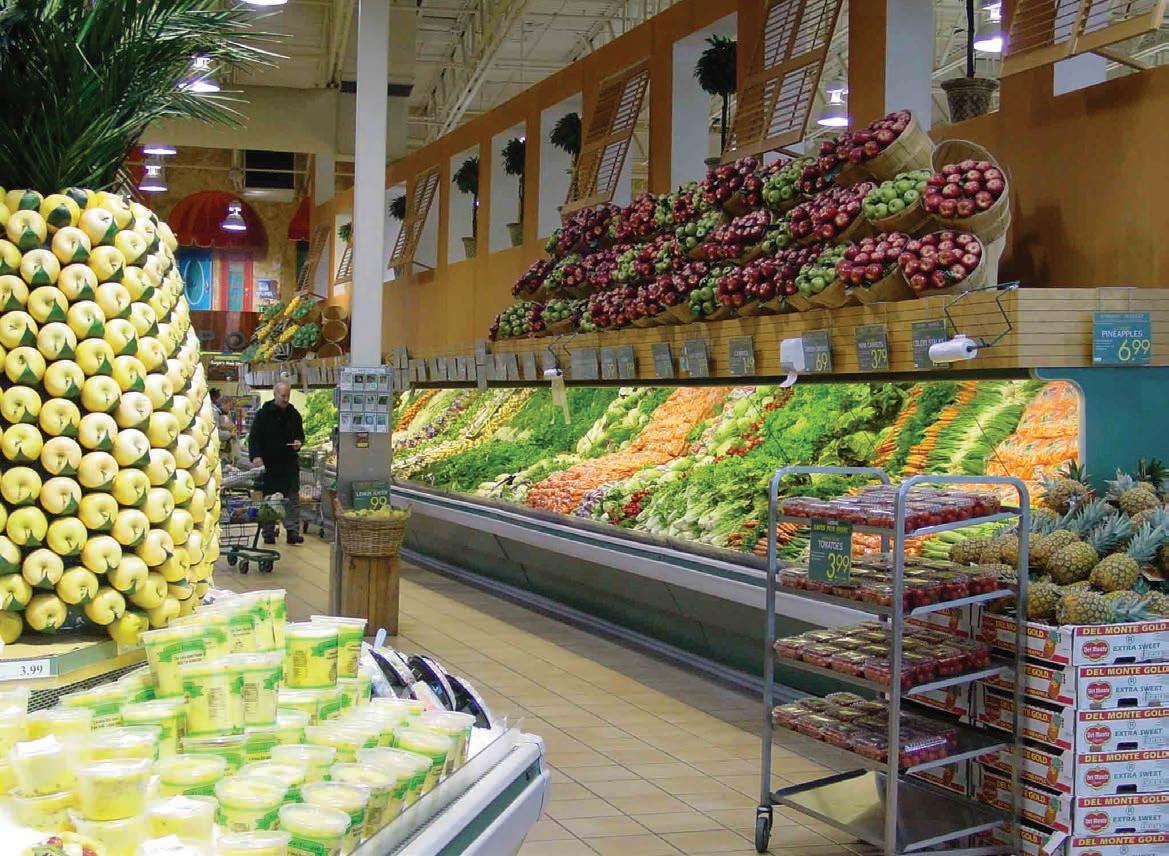
March 2024 · CANADIANPACKAGING 29 CANADIANPACKAGING.COM
other sectors,” Lemaire states.
“Every consumer that walks into a produce department thinks they are a sustainability specialist,” Lemaire remarks, “but very few of them understand the relationship between packaging and produce—specifically 90 per cent of all the things that plastic packaging provides in terms of product protection, shelf-life and other attributes taken for granted that actually occur well before the consumer even sees or touches the product.
As CPMA’s packaging specialist Don Duguay explains, “What consumers see at the store level provides a very narrow understanding of the key functions that packaging provides from the field level on through the entire supply chain before making it onto the shelf.
“So for the government to focus largely on the absence or presence of plastic at the store level provides a very narrow perspective on the overall role that plastic packing plays in the framework of sustainability of the entire produce supply chain,” Duguay states.
“You really have to look at all the attributes that packaging has to deliver in terms of food safety, food quality, and conveyance and distribution requirements.”
of packaging used to move that product through the supply chain.”
As Duguay contends, many of these supply chains require the use of plastics due to the lack of feasible affordable alternatives capable of delivering the same shelf-life and product protection properties that plastic packaging provides to keep the overall product costs at affordable levels.

Daniel Duguay, Packaging Specialist,
CPMA
the package I put that strawberry into is going to be able to navigate the logistics of getting all the way 5,000 kilometers to a consumer in Canada, while maintaining the same level of freshness and quality as when it left the field and entered the cold chain.”
As Lemaire points out, the fresh produce industry is well aware of the need to improve its environmental performance and has in fact achieved impressive results in that area without heavy-handed government regulations.
“Since we started working on packaging at the CPMA, we have seen a 17-percent reduction in the total packaging mass,” Lemaire states, claiming that more responsible and efficient use of new-generation plastic packaging materials is one of the key factors behind that trend.
“When you think about food affordability, food availability, food, safety, food waste and all those other important factors—they all depend on the choice
“You really have to look at all the attributes that packaging has to deliver in terms of food safety, food quality, conveyance and distribution requirements, and so on,” adds Lemaire.
24-04 Canadian Packaging (8.875x5.75).v2.1.outlines.pdf
“So if I’m packing strawberries in some field in California, I need to ensure
1 2024-02-23 9:33 am

Says Lemaire: “I would argue that we are already implementing a sound plastic reduction strategy through the good governance and direction our industry is taking on lightweighting alternative materials where possible, and the option of selling in bulk where feasible.
“It’s all good to look at alternative materials for different product types: some may work for some markets, but


CPMA OUTLOOK
some may not,” Lemaire remarks.
“But the key we have to look at here is making sure that the packaging meets the market needs in terms of price and product quality.
“So if you have a product with high moisture content that needs to control respiration, plastic may be your only choice,” he notes.
“There is no silver bullet, and there is no one solution that fits all applications,” Lemaire says, “which is where the government falls short.
“The government seems to think that an elimination strategy and a bulk strategy for produce is a simple approach,” says Lemaire.
“But following that approach removes access to certain products from the market, while also driving up costs and waste,” he asserts, pointing to widespread confusion over the circularity and viability of biodegradable plastics that cannot be disposed of in proper composting facilities due to Canada’s weak and patchwork-like recycling infrastructure.
“The bigger issue is how do we leverage these great technologies in our system, and how we manage them within our system,” Lemaire points out. “That’s
the real challenge.
“Unfortunately, the government is trying to leapfrog that challenge because they don’t have a solution,” he says.
“However, jumping right to elimination is actually counterproductive to many existing sustainability strategies in our industry,” he states.
To prevent this from happening, CPMA is planning to engage the government in order to delay, if not repeal, the implementation of the ban in order to give industry more time to develop workable alternatives to single-use plastics.
That said, Lemaire says he is concerned that the current government is now too heavily invested in its policy for political reasons to contemplate a complete about face.
Despite that, CPMA is determined to pull all the stops to make the feds listen.
“We’re lobbying hard to ensure that the government really engages with us on this issue over the next year,” Lemaire relates.
“We are very happy to look at a strategy to reduce unnecessary problematic plastics,” he says, “but there are many flaws with the government’s current approach.

The Half Your Plate initiative was launched by the Canadian Produce Marketing Association in 2015, in partnership with the Heart and Stroke Foundation, the Canadian Public Health Association and the Canadian Cancer Society, to improve fruit and veggie consumption in Canada.
“Hence we want to engage with them to make sure they are not making any more unnecessary decisions that are problematic for the food industry.
“So our offer to the government is that while they pause, we’ll work with them to figure out a solution that is good for the industry, the government and, at the end of the day, the Canadian consumers,” Lemaire argues.
“Left unchecked, the current policy would be catastrophic for both the industry and the Canadian population,” Lemaire warns.
“Such a policy would not only dramatically change how our industry functions, “ he says, “but it would have dramatically impacted how Canadians eat and the health of Canadians.
“We know that for every serving of fresh produce that Canadians cut out from their daily consumption ultimately adds up to an extra billion dollars in health-care costs each year,” he points out.
“Packaging plays a key role in driving higher consumption of fresh fruits and vegetables across Canada and beyond,” Lemaire concludes. “It’s not just a piece of the puzzle; it is in fact a catalyst for supporting healthy eating.”

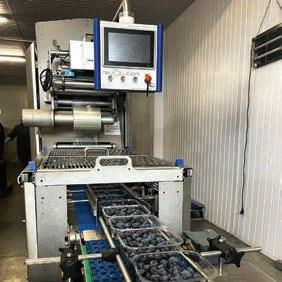

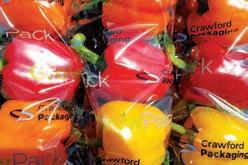






Topline Farms facility manager Dave DiMenna proudly holding up a corrugated shipping carrier containing trays of the company’s signature mini cucumbers wrapped in recyclable PEXY stretch film supplied to the Leamington distribution center by Canpaco, along with the pre-printed corrugated shipping containers.

TOP OF MIND
Ontario greenhouse operator reaffirms its packaging sustainability mindset and credentials with switch to recyclable stretch film packaging
By George Guidoni, Editor
Putting good things into small packages is all part of a day’s work for good folks at the Westmoreland Sales-Topline Farms distribution center in Leamington, Ont., where farming and packaging sustainability have long been two flip sides of the same coin.
Located a 45-minute drive from the Canada-U.S. border crossing in Windsor, the 100,000-square-foot warehouse is a year-round, around-the-clock produce packing and distribution facility that lies at the heart of privately-owned greenhouse operator with a proud track record of serving North American market for fresh Canadian-grown cucumbers, peppers and tomatoes for over 50 years.
“Sustainability is at the core of every business decision we make,” says Dino DiLaudo, vice-president of sales and marketing for Westmoreland Sales.
“From the installation of solar panels at our warehouse to our growing methods, the packaging materials we select, and all the way to our continuous improvements in fleet efficiency, we are always monitoring our emissions and looking for ways of lowering our environmental impact,” DiLaudo states.
As he relates, over the years Topline Farms has grown into one of North America’s largest suppliers of greenhouse-grown mini cucumbers (cukes), which have practically become the company’s signature calling card.
In addition to its snack-sized minicukes and the classic Long English Cucumbers, the company is also well-known for the quality, taste and variety of its peppers and tomatoes, including:
• Bell and Mini Sweet peppers in various colors.
• Tomato varieties such as Beefsteak, Tomato-On-The-Vine (TOV), Grape, Cherry, Roma, Mini Roma and Cocktail tomatoes.
32 CANADIANPACKAGING · March 2024 CANADIANPACKAGING.COM
PRODUCE PACKAGING
• Various types of eggplant.
“Our products are enjoyed throughout Canada and the United States by consumers at home and when dining out,” says DiLaudo, noting that the company ships between 70 and 90 different SKUs (stock-keeping units) of its flagship Topline brand of packaged produce on yearround basis.
“Although private label programs constitute a significant portion of our business, our Topline labeled products experienced consisted growth over the past few years,” DiLaudo notes.
“We service a broad range of customers, from major national retailers to smaller regional players.”
The growing customer base naturally keeps the Leamington operation busy at all times, according to Westmoreland Sales facility manager Dave DiMenna.
“We typically run two 10-hour shifts with at least 250 employees per shift,” DiMenna states.
“With the adoption of LED lights, the growing season has been extended and the typical seasonal fluctuations are less of a factor,” says DiMenna, although there are spikes in demand during the traditional holiday seasons and special day occasions like the 4th of July, Labour Day, etc.
According to DiLaudo, being a master of its own fate provides Topline Farms with a distinct competitive advantage in a hotly contested market.
“We are a vertically integrated produce company, meaning that we have consolidated the entire supply chain, from seed to shelf,” he explains.
“We grow, pack and ship our own produce under one label, Topline Farms, and we are privately owned by a group of shareholders who are also the main greenhouse growers for the operation,” DiLaudo relates.
“Additionally, we have a network of grower partners in the region and in Mexico, who supplement our produce supply in order to fill customer needs.”
As DiLaudo explains, “It’s an extremely competitive industry with many established players.
“Essex County is home to several large greenhouse growers that compete amongst themselves for market share and shelf space inside retail stores,” he elaborates.
“We also compete with different farmers throughout North America and that forces us to continuously seek innovative ways of increasing our output, from leveraging LED lights inside our greenhouses to incorporating automation in the packing process.
“One major advantage Topline Farms has over other growers is the complete control over distribution,” says DiLaudo, describing formation of the company-owned Westmoreland Transpor-



(Top)
A close-up of the fully-recyclable packs of Topline mini cucumbers consisting of fiber-based trays overwrapped with the recyclable PEXY polyolefin-based stretch film that has replaced the non-recyclable PVC film previously used to package this product line.
(Middle)
Topline Farms’ LED-equipped greenhouses provide the optimal conditions for plants to flourish, securing a consistent supply of Canadian-grown produce throughout the year, even during the harsh Canadian winters.
(Bottom)
Shipping trays filled with fresh-grown TOVs (tomatoes on the vine) being conveyed towards the Leamington facility’s end-ofline packaging area for palletizing and stretchwrapping prior to shipment.
March 2024 · CANADIANPACKAGING 33 CANADIANPACKAGING.COM

tation unit as a “strategic move that allowed the company to keep distribution costs down, minimize delays and build our own delivery lanes.”
This high degree of self-reliance allows the Leamington DC facility to concentrate on what it does best—packing processed fresh product into attractive, functional and increasingly sustainable packaging with optimal shelf-life properties and product freshness.
Boasting several globally recognized certifications for food safety and quality— including CFIA, PrimusGFS, USDA Organic and Canada Organic—the facility houses four different production lines equipped with high-performance automatic and semi-automatic machinery to keep the lines running smoothly.
“We rely on automation for higher volume packs, such as mini cuke trays and boxing TOVs (cluster tomatoes),” says facility manager DiMenna.
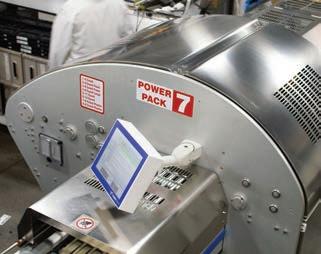
Supplied
film wrapper helps the Leamington plant’s cucumber packaging line optimize the consumption of the recyclable PEXY film featuring outstanding clarity, breathability and puncture resistance to ensure superior product presentation at the retail level, along with extended product shelf-life.

“Our semi-automated production equipment allows us to shrinkwrap, flowwrap, top-seal and clamshell product in nearly 100-percent recyclable packaging,” says DiMenna, lauding the company’s ongoing switch from PVC (polyvinyl chloride) films to the more eco-friendly and recyclable PE (polyethylene) films— vastly improving the environmental footprint of its mini-cucumber packaging.
“In partnership with a major Canadian retailer, we have phased out of PVC films when packing our cucumbers and mini cucumbers to maximize recyclability and lower our overall environmental impact,” DiMenna relates, adding the company plans to switch over to PE film for all the vast majority of its top-sealed and stretch wrapped products.
“This material change allows for the same level of food safety, preservation and retailer presentation,” he says, “while being 100-percent recyclable and eliminat-

ing the release of chlorine gas that is typically associated with PVC production.”
To make the packaging switch happen, Topline Farms has worked closely with the local branch of leading Canadian packaging materials supplier Canpaco, the official North American distributor for the PEXY range of PE stretch films supplied by Italian-based packaging specialists Fabbri Group.
According to Fabbri, PEXY is a polyolefin-based stretch film containing polyethylene polymers, making it ideal for use in packaging of fresh foods. With gas permeability0 five times higher than that of similar films, PEXY allows for better food preservation, according to Fabbri, and it can be safely used both on industrial and retail wrapping machines.
Moreover, PEXY can withstand temperatures even below zero—typical of the freezing process without ulcerating or embrittling—offering optimal protection

34 CANADIANPACKAGING · March 2024 CANADIANPACKAGING.COM
(Left)
by Reiser Canada, the Fabbri Power Pack 7 stretch
(Bottom left)
The new 65,000-squarefoot Canpaco warehouse in Kingsville, Ont., was started up specifically to look after all the packaging needs of fresh produce suppliers across the Essex County and beyond.
(Bottom right)
PACKAGING
Stacks of finished pre-printed corrugated shipping trays at the Canpaco warehouse facility in Kingsville awaiting their shipment to the Topline Farms distribution center in nearby Leamington.
PRODUCE
to the food without suffering ‘cold burns’—while also providing superior puncture resistance.
Thanks to its unique chemical physical properties, PEXY ensures superior sealing performance, according to Fabbri, leveraging its transparency, brilliance and effective “anti-fog” properties to create maximum shelf appeal for the packaged products. In addition, the proprietary technology behind this film also allows users to optimize the consumption of material by taking advantage of its extensibility characteristics.
According to Fabbri, the PEXY film performs best when used on Fabbri-made stretch film wrapping machines, such as the Fabbri Power Pack 7 overwrapper supplied to the Leamington distribution center by Burlington, Ont.-based food packaging machinery distributor Reiser Canada
According to Canpaco president Robert Appel, “The PEXY film is a highly innovative sustainable alternative to PVC film, which is now used by Topline Farms to achieve a more sustainable package for a better future.”
According to Appel, Canpaco has been working in close partnership with Topline Farms for the past five years, supplying the grower with various packaging consumables and materials such as corrugated boxes, PP tomato inserts, BOPP film for peppers, clamshells, clear PET plastic trays, mini-cuke and pepper bags and cornerboard, among others.
“Canpaco has been an integral part of the produce packaging supply chain that you are seeing on all the shelves at retail grocery chain levels,” Appel states.
“Over the last nine years Canpaco has strived to increase our footprint in the produce industry by selling sustainable packaging and solutions to all their partner customers,” he relates.
“Recently, Canpaco put up a 65,000square-foot facility in Kingsville, Ontario, to support their growth and to better serve the southwestern Ontario region.”
Appel’s enthusiasm about the PEXY alternative is readily shared by DiLaudo.
“Packaging always plays a major role in our strategic decisions,” DiLaudo states.
“Not only are we happy to work with our retail partners to use sustainable materials, but we’re also always trying to enhance our in-store presentation.
“We recognize the value of an aesthetically pleasing label as a key driver in sales,” says DiLaudo, adding that Topline Farms has already received a lot of positive feedback form its clients since the switchover.
“In general, the market has a very positive perception of our products—the volume of produce we move is a testament to that,” DiLaudo states.
“Compared to most field growers, our tomatoes, peppers and cucumbers are
more uniform in shape and have consistent flavor—separating greenhouse grown products from the rest.
“Additionally, growing in a controlled environment allows for improved yield consistency,” DiLaudo points out.
“Retailers place a high value on surety of supply,” he states, “and that’s what has catapulted the company to reach its current size.
“Our retail partners also appreciate our strict adherence to their packing specifications, which can be exemplified by the lower than one-percent rejection rate across all deliveries.
As DiLaudo relates, smaller-sized products such as mini-cukes and snacking tomatoes are becoming extremely popular with today’s busy on-the-go consumers, and Topline Farms is working hard to take advantage of this trend through further product and packaging innovation.
“Each commodity has its own array of different varieties,” he says, “and lately there has been an increase in demand for bite-sized and snacking varieties.
“Besides the PVC to PE transition we’re experiencing at the moment, another good example is the introduction of the Grab n’ Go Snacking Tomatoes cup to a few retailers in the U.S.,” he relates.
“With consumers increasingly looking for healthier snacking alternatives, the four-ounce Grab n’ Go cups can be displayed at the checkout lane, capitalizing on impulse purchases that are also guiltfree.”
As DiLaudo sums up, “Controlled environment agriculture allows us to exercise better control over the resources we use to grow our crops, resulting in a more environmentally friendly-growing cycle.
“Our orders are staged in our cooled environment and typically shipped out same day to arrive at our customers to be as fresh as possible,” says DiLaudo, adding the company is an active and proud member of the CPMA (Canadian Produce Marketing Association), whose own effort to promote packaging sustainability within the produce sector is very much in line with Topline’s own environmental agenda.
“Being a CPMA member gives us the opportunity to become a highlighted vendor at the most important produce trade show in Canada, where we connect with our retail partners and share any new products we are introducing to the market,” DiLaudo concludes.
“It also allows us to take advantage of industry data and insights CPMA compiles and makes it available to all its members.”
SUPPLIERS
Canpaco Inc.
Fabbri Group
Reiser Canada
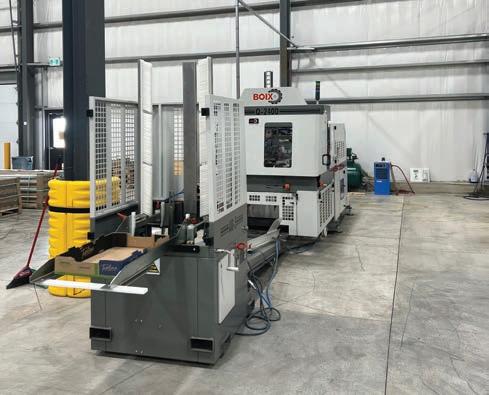



A high-performance Boix tray former at the Canpaco facility in Kingsville used to fold and glue sturdy corrugated produce shipping containers for Topline Farms and other Canpaco clients; an automated self-guided mobile shuttle-car carrier delivering fresh product to the Leamington facility’s processing and packaging area; a fully-automatic rotary-arm stretchwrapper prepares a palletized load of product for shipping.
March 2024 · CANADIANPACKAGING 35 CANADIANPACKAGING.COM
(From top)
X-RAY TECHNOLOGY: Supplier Requirements Will Never Be the Same
By Davor Djukic, National Sales Manager –Product Inspection, METTLER TOLEDO
In recent years, the increasing number of food and beverage product recalls have resulted in major retailers pushing their suppliers to implement more inspection equipment in their line.
X-ray inspection has been proven to effectively detect a wide range of physical contaminants in food manufacturing and packaging. That is its primary purpose in these settings, but it would be wrong to think that this is the only dimension to x-ray technology’s capabilities within the product inspection field. It can do much more.
DETECT CONTAMINANTS AND UPHOLD FOOD SAFETY
Given the importance attached to food safety, and the scrutiny this area is subjected to, foreign body detection is a critical aspect of any food manufacturer’s product inspection operation. While there are alternative technologies for contaminant detection – most notably metal detection – x-ray inspection systems are the most suitable choice for many food products. METTLER TOLEDO’s X2 Series can provide exceptional detection of contaminants such as metal, glass, calcified bone, mineral stone and certain plastics and rubbers, regardless of the contaminant’s shape, size, or location within the product.
Food manufacturers have an obligation to their customers, such as retailers and supermarkets, and to the public in general to minimize the risk that foreign bodies in food products might reach consumers. Failure to do so, and failure to show that the necessary steps are in place to safeguard against this, can have serious consequences for manufacturers.

AVOID PRODUCT RECALLS
For food manufacturers, product recalls represent a twin-headed peril: the costs of wasted products and production time on the one hand; the damage to its good name on the other. The experiences of many brands over the years have shown that while the former costs are often quickly absorbed, the negative effects on brand reputation can be much more long term.
With the increasing number of product recalls seen in recent years, implementing a well-designed x-ray inspection program can eliminate these negative effects. In addition, with METTLER TOLEDO’s ProdX™ real-time data collection, smaller contaminated batches can be identified and recalled instead of the entire production run.
COMPLY WITH REGULATIONS AND RETAILER SPECIFICATIONS
This year, many major retailers are asking food manufacturers to implement x-ray inspection equipment in their line as an added layer of protection. Compliance with these various requirements is becoming increasingly important for food manufacturers, and they often must ensure that their good practice covers differing geographical and customer guidelines.
X-ray inspection systems also assist with record keeping, providing an audit trail of activity that allows for disputes and queries to be quickly and transparently dealt with, and documentation easily produced for audit purposes, enabling manufacturers to prove that their x-ray inspection is being maintained to the highest standards.
PROTECT BRANDS
This follows on closely from product recalls, which is a costly and time-consuming step for any manufacturer to have to take, potentially causing profound damage to a brand. However, having to face the embarrassment of recalling several thousand products fades into comparative insignificance if the manufacturer’s lack of product inspection efficacy results in a serious incident that endangers a person’s health or life.
Increasingly, food manufacturers are highlighting their use of x-ray systems as a means of creating an image of higher quality around their products – that both customers and consumers can have greater confidence in products from that manufacturer because x-ray technology is upholding standards. In some cases, this might even be starting to factor in the decisions that retailers and supermarkets make on the products they stock.
Supplier requirements for x-ray are rapidly changing and this is just the beginning. In the future, manufacturers and retailers may be required to provide documentation to prove they are maintaining the operating standards required to protect themselves, their customers, and their consumers. Implementing an x-ray inspection machine will ensure that manufactures and retailers have documentation that show that their x-ray inspection is being maintained to the highest standards.

DAVOR DJUKIC is national sales manager for product inspection at METTLER TOLEDO Inc. in Mississauga, Ont.
36 CANADIANPACKAGING · March 2024 CANADIANPACKAGING.COM
FOOD SAFETY
PATHS TO GROWTH
Leading Canadian packaging distributor leverages its expertise in packaging automation and sustainability to answer the fresh produce market needs

Founded in 1963, Crawford Packaging is one of Canada’s largest and most versatile distributors of packaging equipment and consumables—running a highly integrated network of nine distribution centers across North America to service customers across a broad range of manufacturing industries.
In recent years, the company has identified the fresh produce industry as a promising and lucrative segment that could benefit from Crawford’s formidable expertise in packaging automation and shelf-life optimization, while rewarding Crawford with brisk business growth and expanding customer base.
To find out more about the company’s successful foray into the produce market, the Canadian Packaging magazine recently reached out to its vice president of produce packaging Stuart Jackson to share some of the reasons for that success to date.
QPlease relate the history and strategic importance of the fresh produce market to your company and its business objectives.
AThe produce industry is strategically important for our company due to several key factors. It has emerged as a growth sector, particularly with Canadian growers and marketers expanding into the U.S. and Mexican markets. This expansion aligns well with our business model—focusing on supplying integrated packaging solutions to meet the increasing scale of operations in this sector.
Since we provide primary packaging for produce, we are exposed to evolving
consumer preferences. There is currently a growing demand worldwide to reduce excess packaging and provide environmentally friendly alternatives, driven by increasing consumer awareness and sustainability concerns.
This creates positive pressure for our team to look for, source and develop solutions that align with the needs of retailers.
Our team members are extremely knowledgeable and passionate about the industry. We are not limited by geographical boundaries, and we stay ahead of the trends globally, enhancing our competitiveness and overall position as a company.
QWhat are the primary factors driving growth in demand for fresh product packaging?
AThere are several factors. Firstly, rising awareness of health and nutrition leads to increased consumption of fresh fruits and vegetables year-round. Convenience is also crucial, as consumers seek easy-to-use packaging solutions for quick, on-the-go consumption.
Additionally, there is growing environmental consciousness with consumers, and consequently the retail industry, demanding sustainable packaging options that align with global sustainability goals. This demand fuels innovation towards reducing plastic usage and extending shelf-life.
While there are also voices advocating for eliminating packaging altogether, it’s important to remember that packaging plays a crucial role in reducing food waste, considering the very long distances some types of produce must travel to reach our store- shelves.
Utilizing the right packaging can preserve freshness and reduce food waste, which has reached alarming levels in North America alone.
The fully-recyclable GrowPack Net Trays, made with 50 per cent less plastic, are one of many innovative sustainable solution offered to the fresh produce industry by Crawford Packaging.
Q Which are the most popular packaging formats and materials in the produce industry nowadays?
ARegarding the most popular containers, materials, and formats, these include lidding film, recyclable bags, plastic containers such as clamshells and trays, flow wrap film, shrinkwrap film, and biodegradable containers. Materials include PP, PE, PVC, PET, paper, and fiber. There’s an increasing demand for PCR content in plastic packaging, reflecting the industry’s commitment to sustainability.
Lastly, there is what we refer to as functional packaging, which includes MAP (Modified Atmosphere Packaging), solutions, gas-flushing techniques, and other processes focused on extending shelf-life and reducing waste.
QHow has produce packaging evolved in the last decade? What are some of the biggest innovations unveiled in that time?
AThe last decade has seen a noticeable surge in sustainability efforts, with the primary focus on reducing and optimizing packaging materials to minimize waste and environmental impact.
 Stuart Jackson, Vice-President, Produce Packaging, Crawford Packaging.
Stuart Jackson, Vice-President, Produce Packaging, Crawford Packaging.
Innovations such as lighter-weight materials and designs aimed at decreasing plastic usage have become widespread. Additionally, there is a growing adoption of recyclable, biodegradable, and compostable materials to combat plastic pollution and contribute to a ‘Circular Economy’ model.
Functional packaging innovations, such as Modified Atmosphere Packaging (MAP), have transformed the way produce is packaged and stored. These technologies adjust the atmosphere within the packaging, slowing down the ripening process and extending the freshness of fruits and vegetables. This advancement not only benefits consum-

March 2024 · CANADIANPACKAGING 37 CANADIANPACKAGING.COM PACKAGING FOR FRESHNESS
The RGDMAPE VR8 flow wrapping machine offers outstanding operational flexibility and versatility.
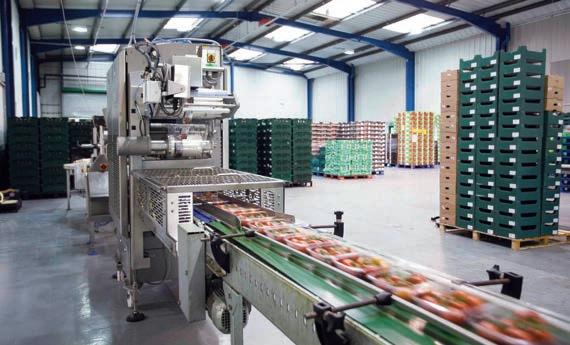

ers by providing fresher produce, but also significantly reduces food waste.
Also, packaging automation has made significant strides over the past decade. For example, flow wrap technology has become popular for its efficiency and flexibility in packaging—maintaining freshness, and offering environmentally friendly options.
However, one of the most impactful automation innovations has been the ongoing refinement of automated tray-sealing technology.
This innovation has had a profound effect on the produce packaging industry, addressing various needs such as reducing plastic usage, preserving produce fresh -
ness, facilitating convenient supply chain handling, and enhancing consumer convenience. Furthermore, it allows for excellent marketing presentation of produce.
QWhat are the biggest trends in fresh produce packaging right now?
ASustainability is undeniably at the forefront of industry trends. The pressing need to address environmental concerns has led to a concerted effort to reduce plastic use across the packaging sector. This trend goes beyond simply reducing plastic: it entails a broader shift towards integrating biodegradable, compostable and recyclable materials into packaging

solutions. The overarching goal is to minimize the environmental impact of packaging.
Other sustainability practices include reducing harmful chemicals, conserving water, and minimizing carbon footprints by incorporating various eco-friendly packaging solutions.
At the same time, convenience has emerged as another driver in packaging innovation—reflecting changing consumer lifestyles that are increasingly fast-paced and mobile.
There is a growing demand for easy-to-carry, resealable, and portion-controlled packaging solutions. These provide consumers with the flexibility to enjoy fresh produce on-the-go, while reducing food waste through improved portion management.
QWhat has been the impact of automation on the packaging process and products used in the fresh produce industry?
AAutomation has transformed the fresh produce packaging process—leading to increased efficiency, improved consistency, and quality, along with significant cost reductions. It has also enhanced the flexibility of packaging operations, allowing quick adjustments to meet changing market demands.
Automation supports speed-tomarket, ensures efficient use of materials, promotes waste minimization, and enables improved food safety through more controlled and consistent packaging processes.
At Crawford Packaging, we offer a variety of packaging automation equipment solutions, with the most popular being tray-sealing and flow wrapping equipment.
We recently installed a flow wrapping machine at a mediumsized pepper grower who heavily relied on manual labour.
With high employee turnover, they found it challenging to employ and train new people—resulting in inefficient processes and inconsistent seals on their pepper packaging.
With the new automated flow wrapping solution, they were able to reduce the number of employees on the line from 16 to just seven, reallocating the remainder to other tasks. In addition to greater productivity, they reduced their perpack cost by 40 per cent, while achieving 100-percent accurate sealing.
QWhat is Crawford Packaging’s value proposition to the fresh produce market?
AWe have a highly dedicated and passionate team in our produce packaging department, where everyone is committed to sourcing, providing, and even developing innovative packaging solutions for North American growers, marketers, and retailers. This commitment has been and continues to be our greatest asset.
Our focus on innovation, sustainability, and efficiency is what sets us apart in the market.
We offer a diverse range of products and services. Some of our latest introductions include fully recyclable net trays made with 50per cent less plastic, flow wrap film, paper top seal, mono-layer top seal, compostable flow wrap, a variety of compostable trays and punnets, shelf-life extension bags, and highspeed tray sealing. We also offer the world’s fastest tray sealing machine, which is truly remarkable!
Moreover, we are continuously searching for better and newer solutions. This drive for continuous innovation and improvement is deeply ingrained in our organization.
Our customers rely on us for our packaging expertise, and their satisfaction is paramount for us.
We assist them in achieving their sustainability goals, extending shelf life, and enhancing the presentation of their produce, all while ensuring cost-effectiveness and efficiency.
Their satisfaction, business loyalty, and friendships are our greatest rewards.
CANADIANPACKAGING.COM
38 CANADIANPACKAGING · March 2024 April 23-25, 2024 2024 VANCOUVER CANADA’S LARGEST FRESH PRODUCE EVENT Connect with • Over 4,000 produce professionals • Over 1,100 produce companies • Canadian major retailers Register now www.convention.cpma.ca #CPMA2024 CPK_CPMA_March24_CSA.indd 1 2024-02-26 9:37 AM
PACKAGING FOR FRESHNESS
(Left) The fully-automatic Revolution tray-sealing machine from Packaging Automation processing fast-moving trays of fresh produce. (Right) The Evolution S tray-sealer from Packaging Automation is claimed to be the world’s fastest and most advanced tray-sealing machine.
will not only be state-of-the-art from a manufacturing perspective, but also be a facility focused on the health and well-being of our team members.
The initial build will be between 50,000 and 60,000 square feet, but we expect to expand that over the next three to five years.
QWhat it the value proposition that Tessera will be able to offer to the market from its centralized location?
AWe have over 35 field technical staff ranging from millwrights and electrician to equipment FSTs (field service tecnicians). We can install/commission stand-alone packaging equipment or move entire facilities with our field mechanical and electrical groups.
At the design/manufacturing level, we are constantly doing R&D and working with our vendors to make sure we are keeping up with the latest technology.
Our CTO, Jake Constantine, leads our technology group and spends a lot of his time learning about industry trends with both equipment and software. We are not afraid to look abroad to find new technologies and bring them to North America if we need to. From the launch of our collaborative robotic line to simple, effective updates to material handling technology, we are always pushing the envelope

for what we can provide to our customers.
QPlease summarize the general market climate, trends and challenges that have a major impact on how you company goes about its business?
AWe saw a trend several years ago emerging to mitigate risk and reduce costs by pushing the integration responsibility down to the OEM level. This meant our CPG customers could reduce the size of their internal engineering groups, while relocating the performance risks of acquiring a new production line, onto the OEM’s. Up until that point, the packaging machine manufacturing industry was very fragmented, whereby companies would design, build and sell a discrete machine that would be included as part of a larger production line. With this shift in how the CPG’s purchased
machinery, we saw the start of consolidation by the OEMs to create “one stop shopping” in order to accommodate them. The Tessera Group ownership has recognized this trend by developed a strategy to provide our clients with integration services and “one-stop shopping.”
In fact, we have gone beyond this to include a full suite of services to provide our customers with not only engineering and project management support, but also in field service, parts supplies and preventive maintenance plans that are tied to consumable supplies.
It is a very holistic approach to ensure that we help further mitigate risk for our customers and ensure predictable costing. We are very excited for the Tessera Group and our customers, as we continue to position ourselves to be a significant force in our industry for the next decade and beyond.

March 2024 · CANADIANPACKAGING 39 CANADIANPACKAGING.COM
SPONSORED CONTENT
A rendering of Tessera Group’s headquarters in Port Perry, scheduled for completion in late 2025.
π SWEET SELECTION COMPLETE LINE OF BOTTLES AND JARS IN STOCK ORDER BY 6 PM FOR SAME DAY SHIPPING 1-800-295-5510 uline.ca CPK_Uline_March24_CSA.indd 1 2024-02-13 9:37 AM
CONTINUED FROM PAGE 23 24_000930_Canadian_Packaging_MAR_CN Mod: February 2, 2024 3:20 PM Print: 02/09/24 page 1 v2.5
Thoughtful packaging that really hits the sweet spot / Shannon Kaupp
Since I began writing this column for Canadian Packaging several years ago, I have found myself generally spending more time at the grocery store than I used to. Sure, I can still fly though and grab all my essentials quickly, but on days when I have more time I find myself perusing the aisles—drawn to things that are packaged to stand out. These are a few of the items I noticed on one of my recent trips.
Based on an authentic Syrian family recipe, the Peace by Chocolate bars first appeared in Nova Scotia in 2016—soon becoming a highly popular items thanks to their delicious taste and cheerful packaging guaranteed to put a smile on anyone’s face. As the brand’s logo deftly proclaims, “One PEACE won’t Hurt,” some of the proceeds from the sales are donated to various organization promoting peace around the world. The 92gram rectangular bars—each one individual wrapped with a colorful message like “I Love You” or “Happy Birthday,” the bars perform double duty as a gift and a greeting card, providing detailed product and nutrient information on the back, along with all of the company’s social media accounts.
On a mission to “Elevate your everyday,” as their brand slogan proclaims, Montreal-based Kanel Seasonings is making packaging do all the hard work to provide effective product differentiation on the grocery store shelf next to the glass and plastic bottles. Packaged in sleek, elegant fiber-based cylinders, the Kanel spices are made from simple natural ingredients, whereby the salt blends are packaged in white cylinders and other seasoning in black ones, with both blends contained in resealable compostable inner bags to keep them from clumping together. The bags are inserted into the fully-recyclable, BPA-free tubes made from wood pulp and held together with non-toxic, water-based glue.
Lovingly crafted in Southampton, N.Y.,


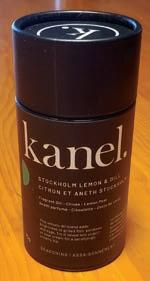


the Tate’s Bake Shop cookies really stood out to me on the grocery store shelf, with the gentle and soothing packaging look projecting an image of a small-town family bakery. The bright green color of the 198-gram bags provides an eye-pleasing backdrop to the tantalizing close-up cookie images dominating the front panel, and the paper bag is made resealable via the old-school method of folding the top of the bag and closing it with metal tabs attached to the sides. The back panel provides ample information about the cookies, the company, and all the required ingredients and nutritional information. While I have misgivings about the cookies being sealed inside smaller single-use plastic packages to maintain freshness, I am sure the brand is looking for ways to address this slight shortcoming.
Montreal-based Mandy’s Gourmet Salads sells its internationally inspired salad dressings in 250-ml glass bottles wrapped in matching but colorfully unique full-body wraparound labels, color-coded depending on the type of dressing. Each label features a small rectangular window on the side so that the shopper can see the dressing inside, while the front of the label keeps thing straightforward and simple by featuring the dressing flavor and brand name in large black type for a clean and uncluttered look.
Produced by Les Industries Bernard & Fils Ltee of Saint-Victor, Que., the Old Fashioned Maple Crest Maple Syrup really does not hold back in its quest to make serious shelf impact with a whisky-style 946-ml glass bottle, adorned glittering foil-stamped label provides the perfect aesthetic match for the 100-percent pure maple syrup distinguished by outstanding clarity. The label also reveals some fascinating information about the company’s history: like the fact that Bernard and Fils are 5th generation Master Sugar Makers with 200 years’ experience making maple syrup. Being Canadian never tasted so sweet!

in Halifax.
40 CANADIANPACKAGING · March 2024 CANADIANPACKAGING.COM CHECKOUT
SHANNON KAUPP is a licensed neuropathic doctor living
(Clockwise from top left)
Abbey Equipment Solutions 2 Beneco Packaging 16, OBC Canadian Corrugated & Containerboard Association 28 Canadian Produce Marketing Assoc 38 Canpaco 24 Crawford Packaging 31 Farm Credit Canada FCC 7 Fortress Technology Inc 10 Harlund Industries Ltd 13 Heat and Control IFC KRONES, INC 9 Mettler Toledo 36 Plan Automation 8 Reiser / Robert Reiser & Co. 5 SIAL Canada / Expo Canada France Inc. IBC Technical Adhesives Limited 27 Tessera Group Inc. 22 Uline Canada Corporation 39 VC999 Packaging 6, 12 Videojet Canada 1 Volm Companies 30 AD INDEX
A couple of Peace by Chocolate chocolate bars; the Old Fashioned Maple Crest Maple Syrup from Les Industries Bernard & Fils ; Mandy’s brand of Tamari Vinaigrette salad dressing; Tate’s Bake Shop gourmet-quality cookies; Kanel Seasonings spice blend sold in compostable, fiber-based round cylinder packaging.



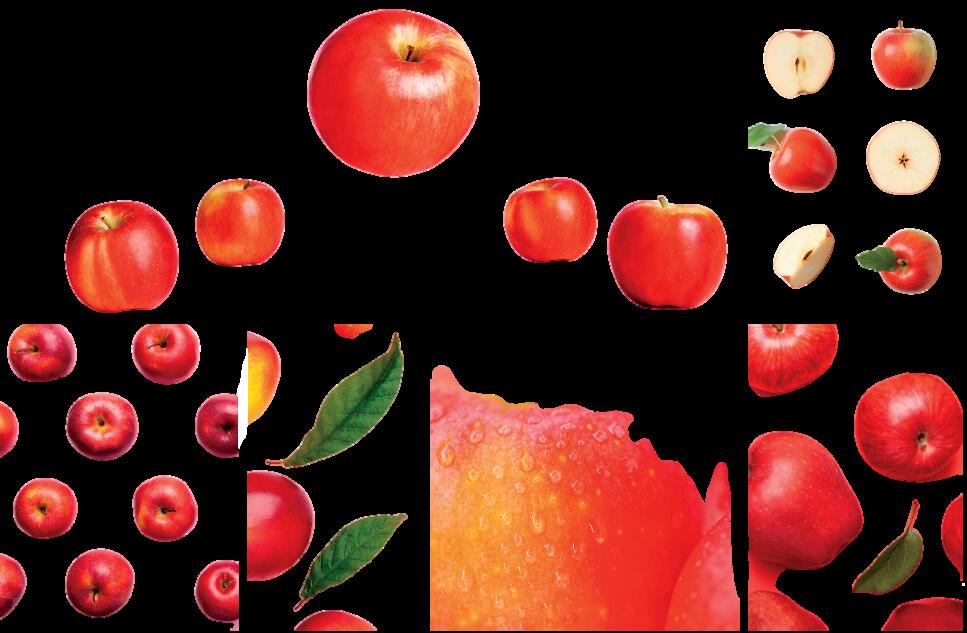











17 Supported by : Proud partner of : 15 MAY 2024 MONTRÉAL S I A L C A N A D A C O M # S I A L C A N A D A THE AGRI-FOOD BUSINESS ACCELERATOR IN NORTH AMERICA GET 50% OFF WITH THE PROMO CODE CPSIAL24 Register Now to attend the tradeshow P A L A I S D E S C O N G R È S D E M O N T R É A L

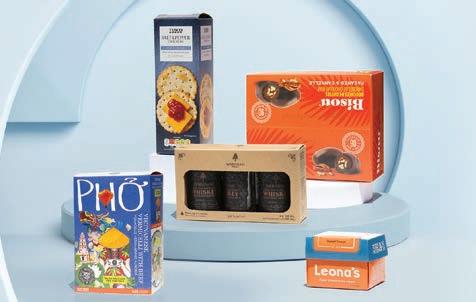
benecopackaging.com SoOPAK.com benecopackaging.com SoOPAK.com We cater to Canada’s most demanding CPG’s. Whether your needs are large or small, Beneco will surpass your expectations. Our box plants feature the most advanced and most efficiently run Heidelberg box printing/converting technology and we haven’t stopped investing. Put our folding carton investments and efficiencies to work for you. You bet! Beneco Custom Print Packaging 1-905-677-2888 sales@benecopackaging.com Call Beneco today for your folding cartons. Folding cartons quicker and cheaper?






















 GEORGE GUIDONI, editor GGuidoni@canadianpackaging.com
GEORGE GUIDONI, editor GGuidoni@canadianpackaging.com

























































































 Above: Jaime Alboim, Chief Executive Officer, Tessera Group
Above: Jaime Alboim, Chief Executive Officer, Tessera Group



















 Ron Lemaire, President, CPMA
Ron Lemaire, President, CPMA
































 Stuart Jackson, Vice-President, Produce Packaging, Crawford Packaging.
Stuart Jackson, Vice-President, Produce Packaging, Crawford Packaging.
























